A post on the ancient Shri Vaikuntanathar Maha Vishnu Temple on the banks of the holy Thamirabarani river at Srivaikuntam near Tirunelveli, TN. It is an astonishing Temple with a rich history & mindblowing sculptures. It is also one of the 108 Divya desam Temple which is heavily praised in the Naalayira Divya Prabhandham (a holy Srivaishnva text)
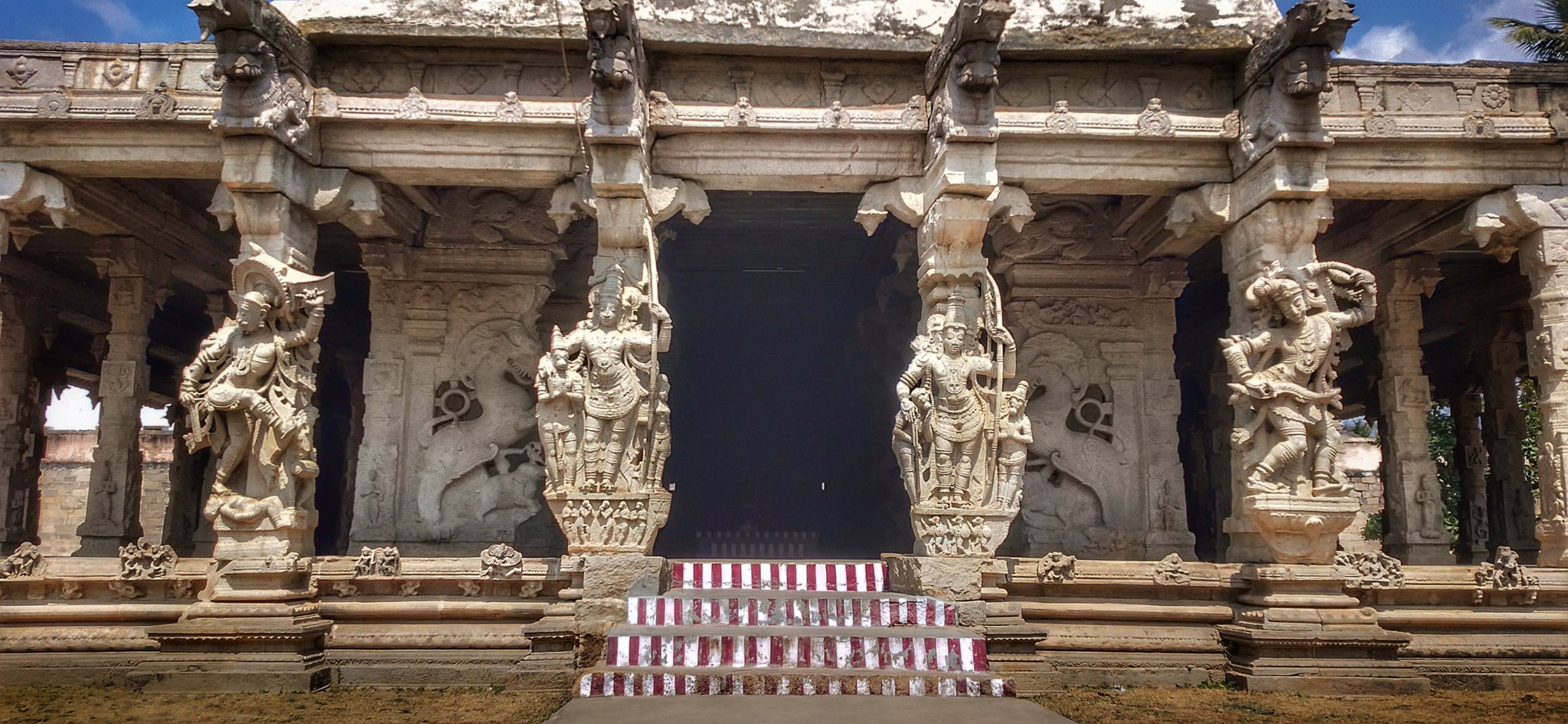 |
| Thiruvengadamudayan mantapam |
The Vaikuntanathar Temple is very closely associated with the Matsya avatara of Maha Vishnu. Lord Brahma who is the custodian of the Vedas loses it to an asura named Somakasura, who in turn takes the Vedas with him & hides deep beneath the ocean.
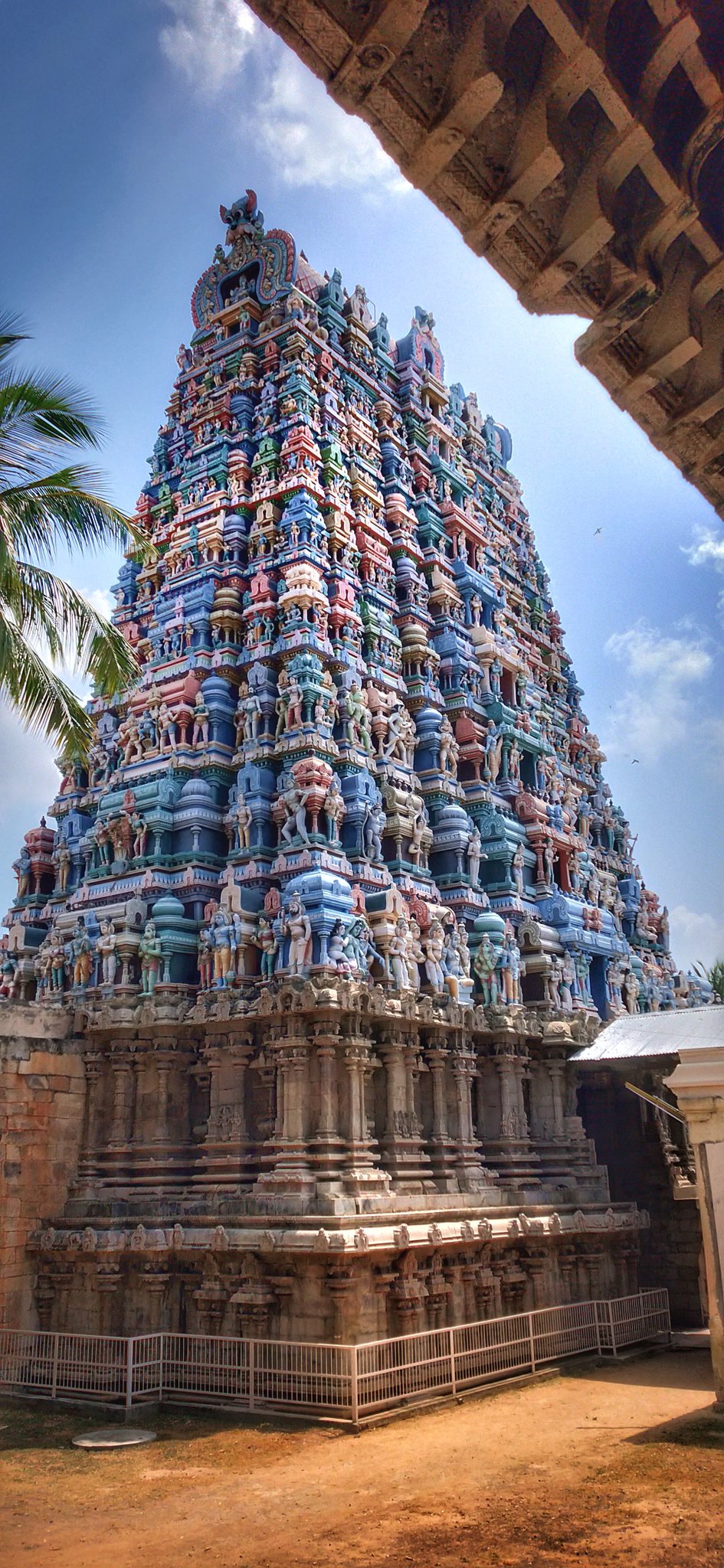 |
| Rajagopuram |
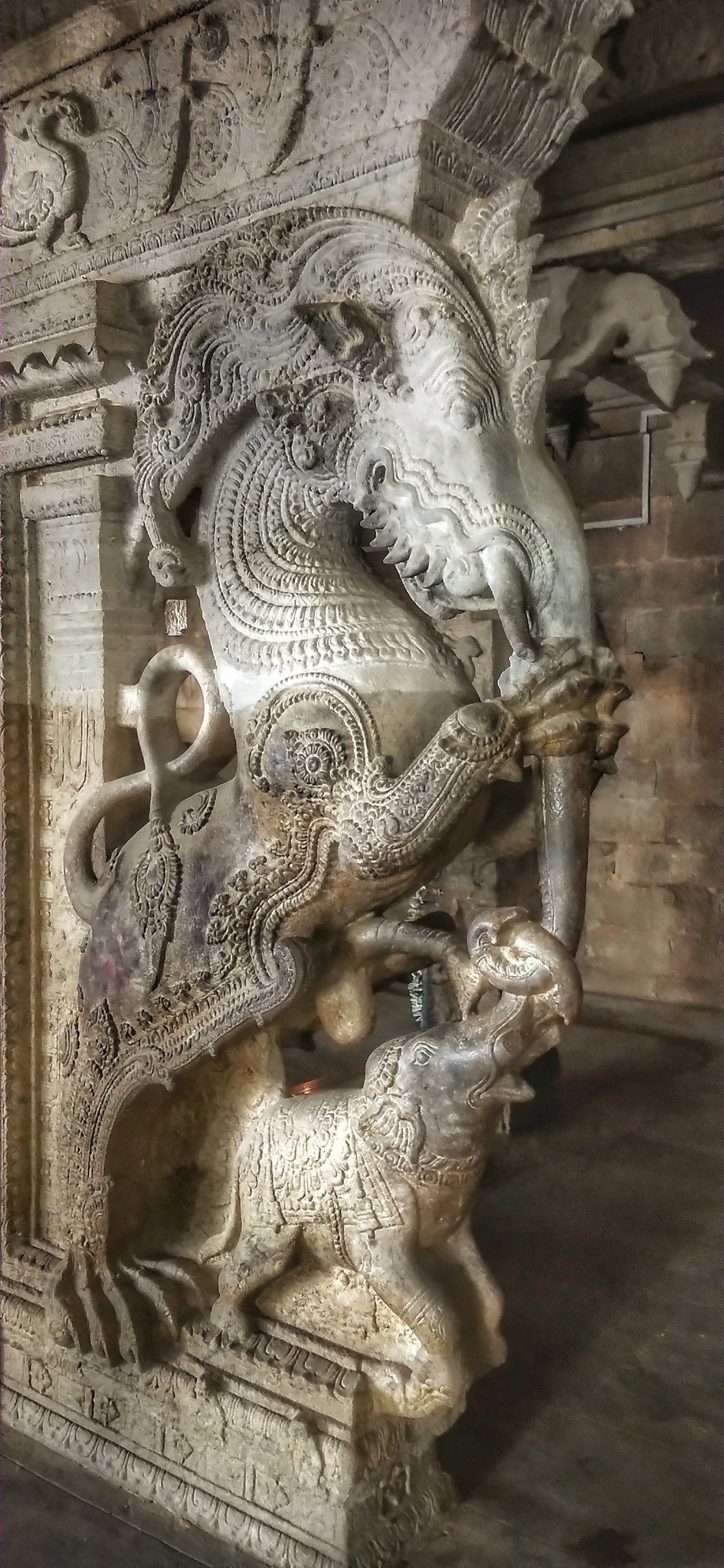 |
| Yali Pillar |
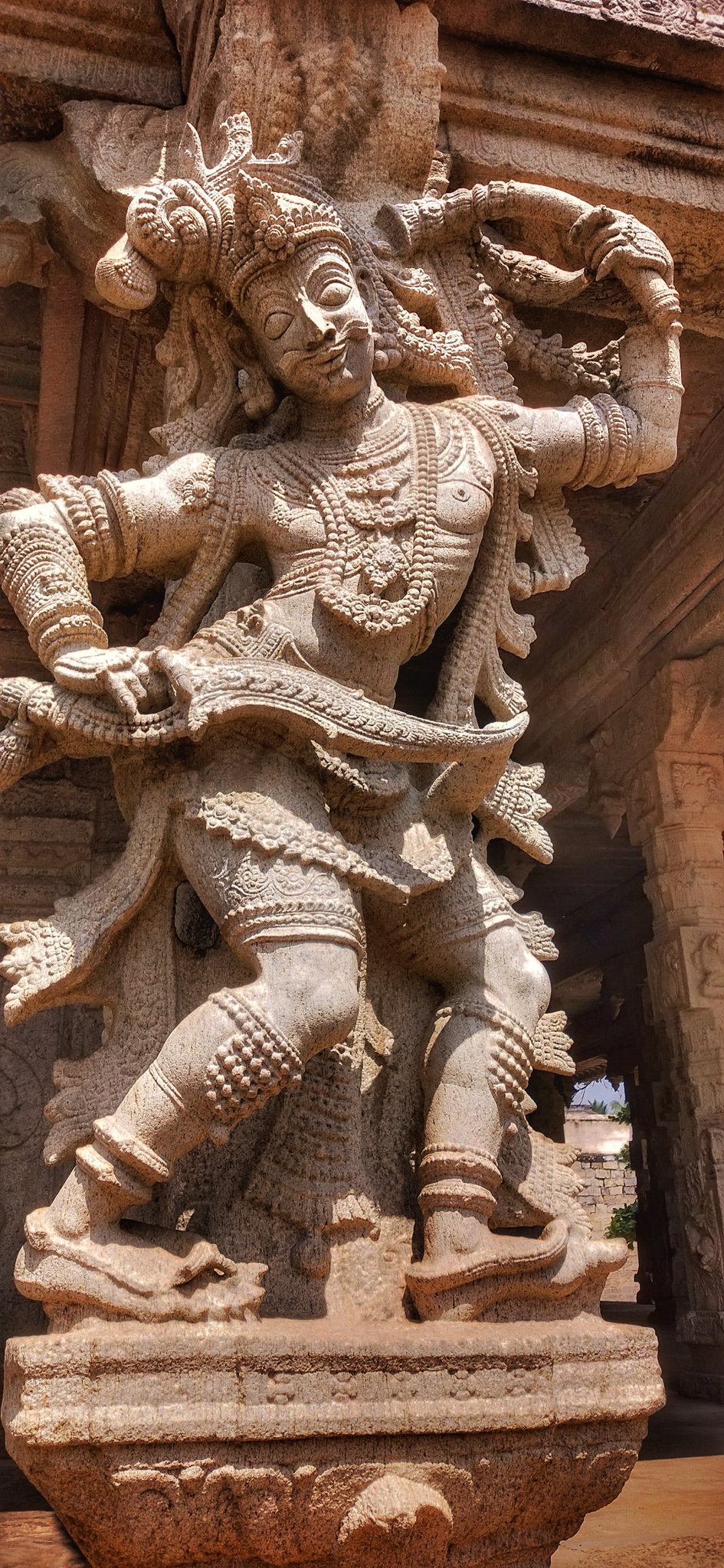 |
| Arjuna |
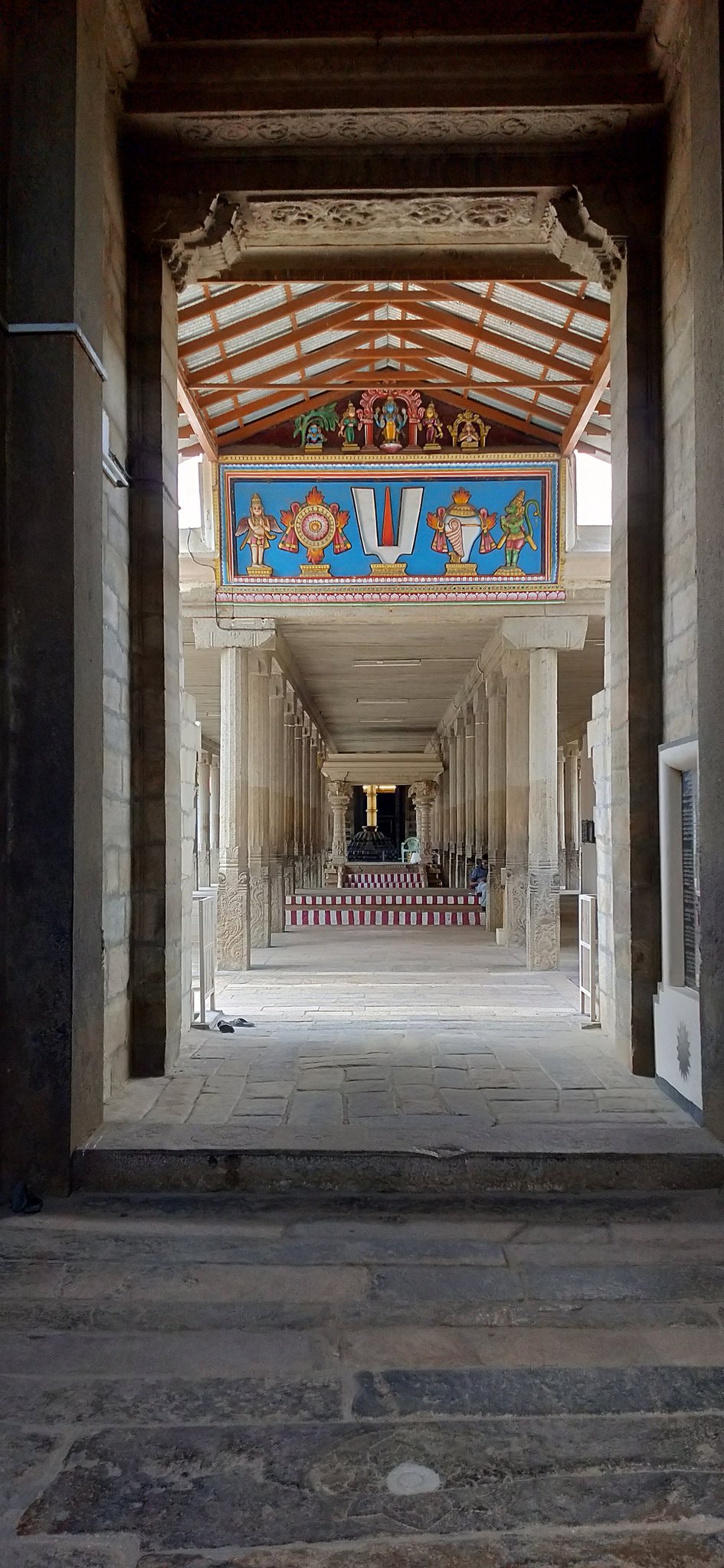 |
| Temple Entrance |
Brahma, who is the creator was rendered helpless without the Vedas. So he does severe penance on the banks of the holy Thamirabarani river seeking Maha Vishnu's help to retrive the Vedas from Somakasura, which Vishnu does as Matsya avatara. This is the Sthalapurana of the Temple.
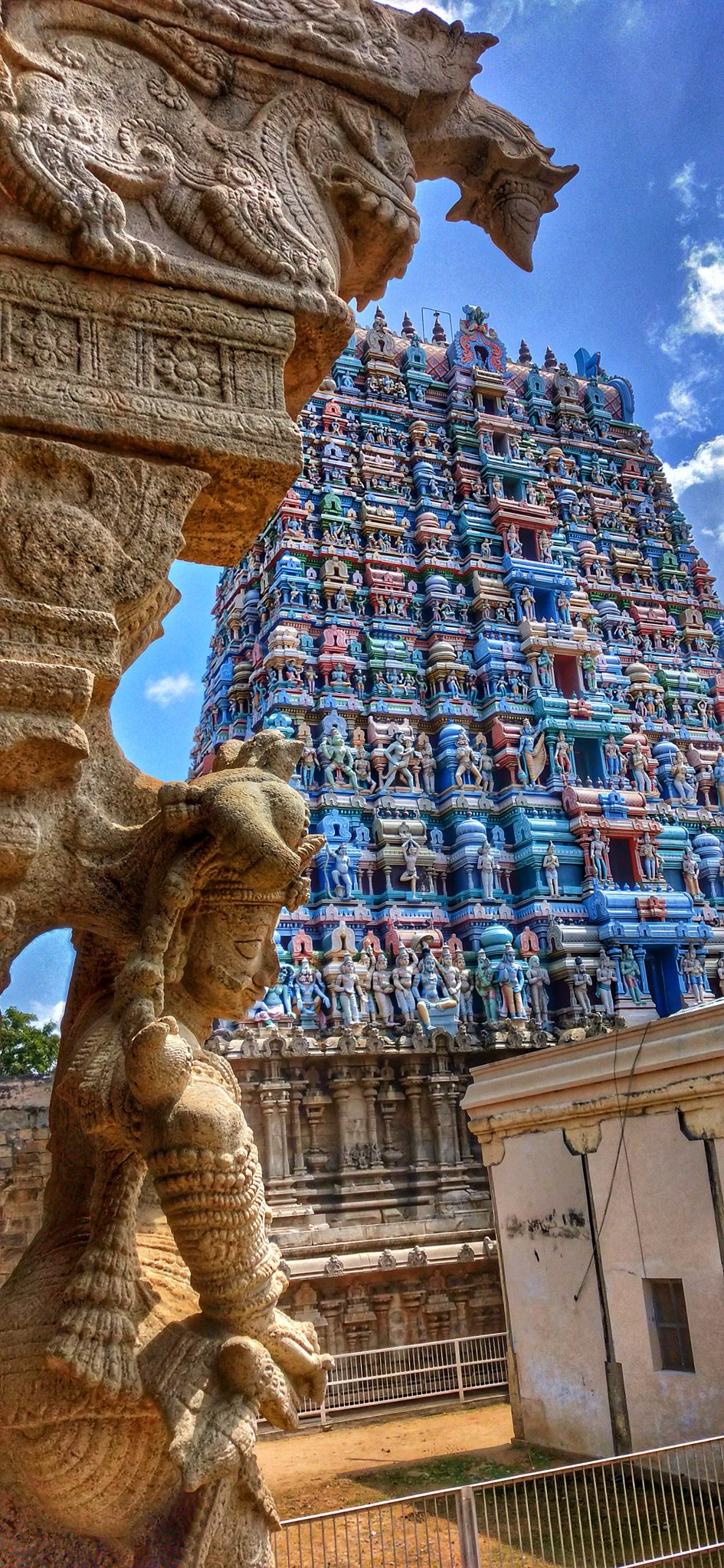 |
| Rajagopuram from the Thiruvengadamudayan mantapam |
The original Temple structure was put in place by the Pandyas, who ruled much of what is present day Southern Tamil Nadu from their capital Madurai. The Temple was subsequently majorly expanded during the reign of the Madurai Nayakas who were feudatories of the Vijayanagara empire.
 |
| Rajagopuram from the Shri Ramar Mantapam |
The two Gopurams as seen from the outer prakaaram. The Rajagopuram stands at height of 110ft.The Mantapams at the Temple have numerous pillars, with some of them having ornate carvings of Simhas & Yalis. The are extremely lengthy & contained with them are smaller Kalyana mantapas which have life size carvings pillar carvings.
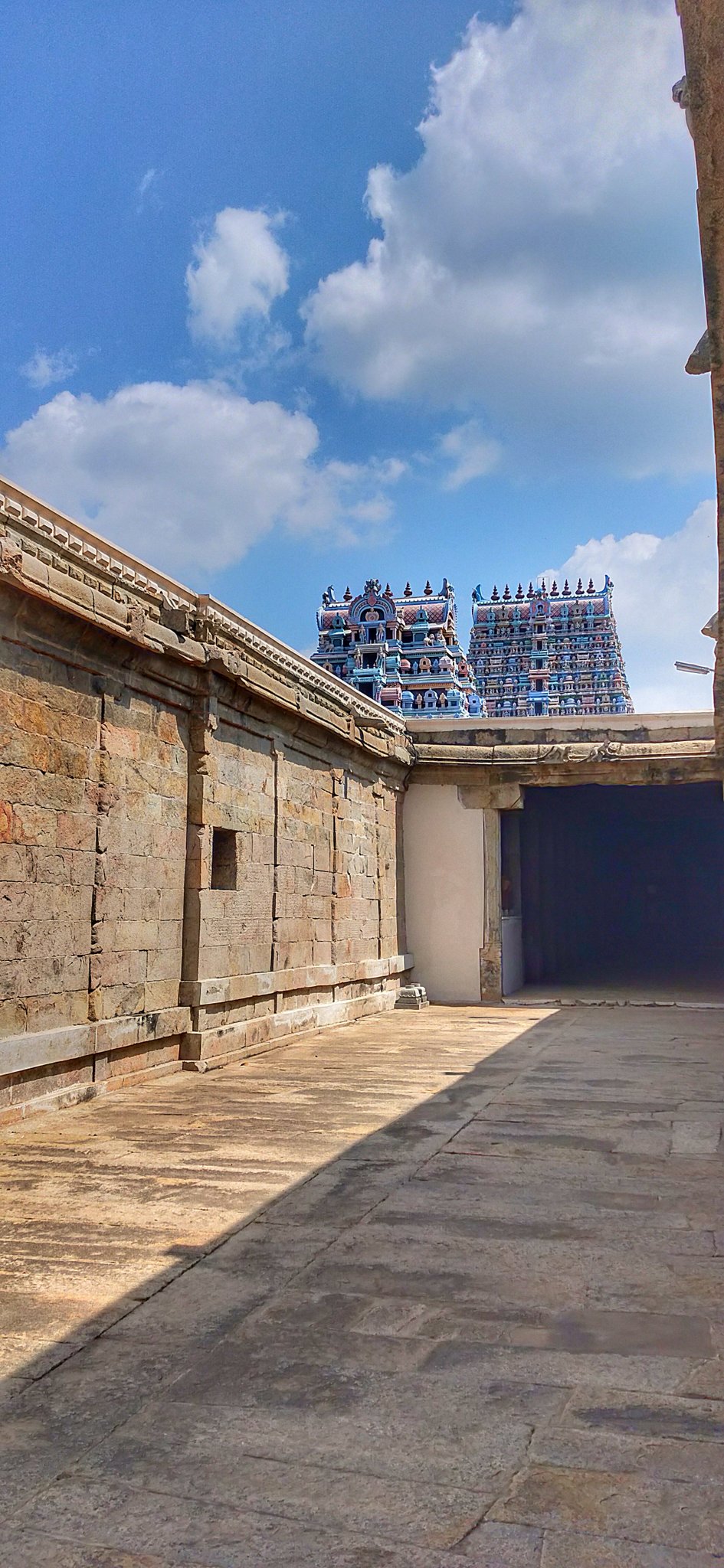 |
| Gopurams 1 & 2 |
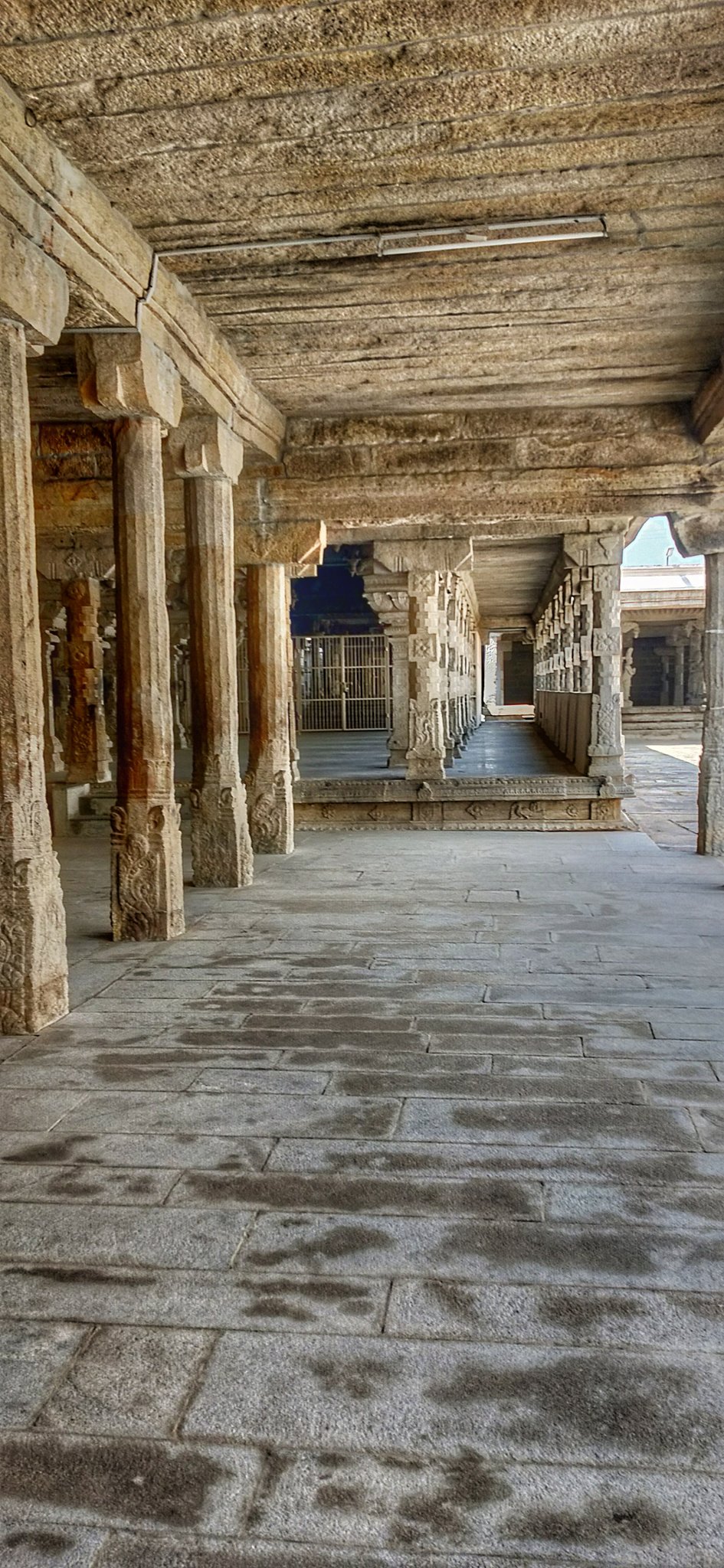 |
| Inner Mantapam |
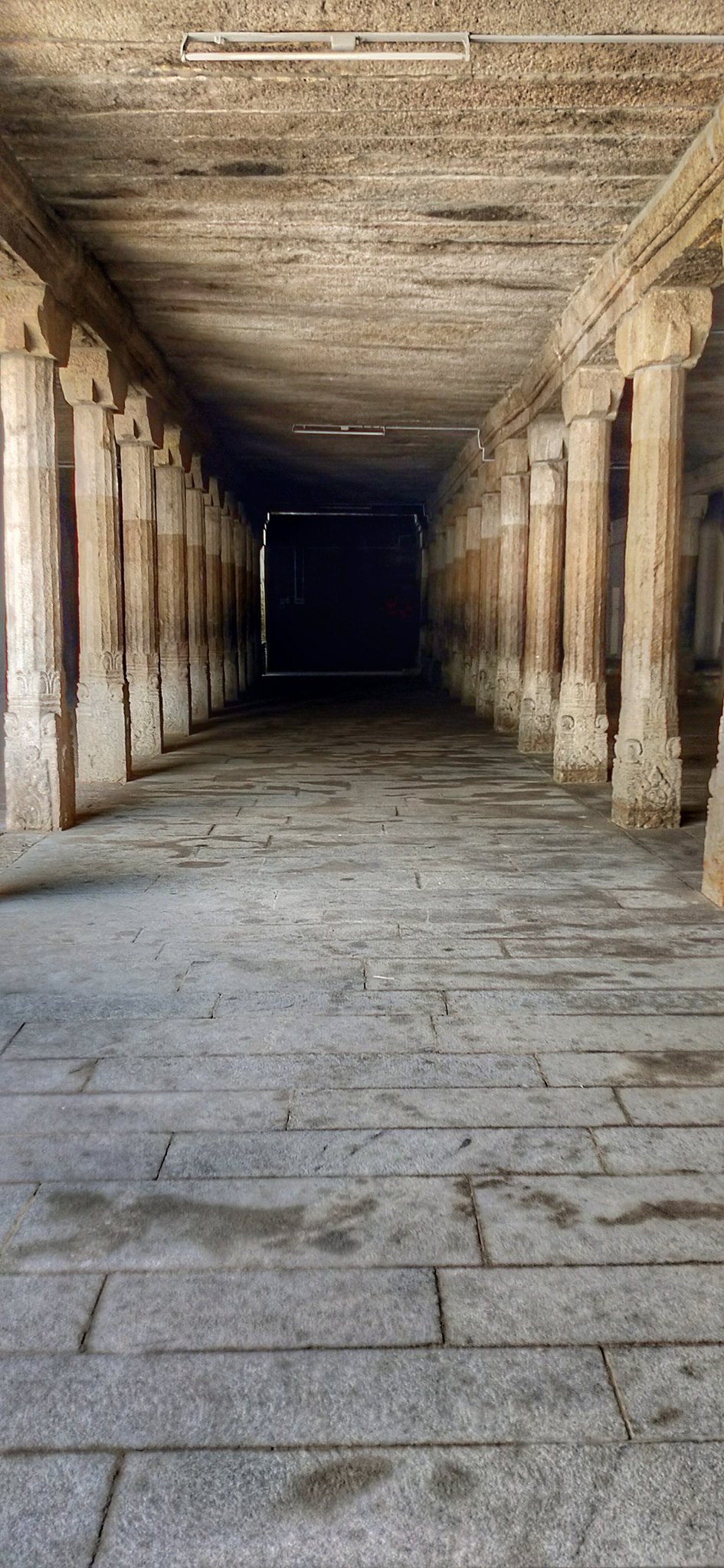 |
| Mantapam pillars |
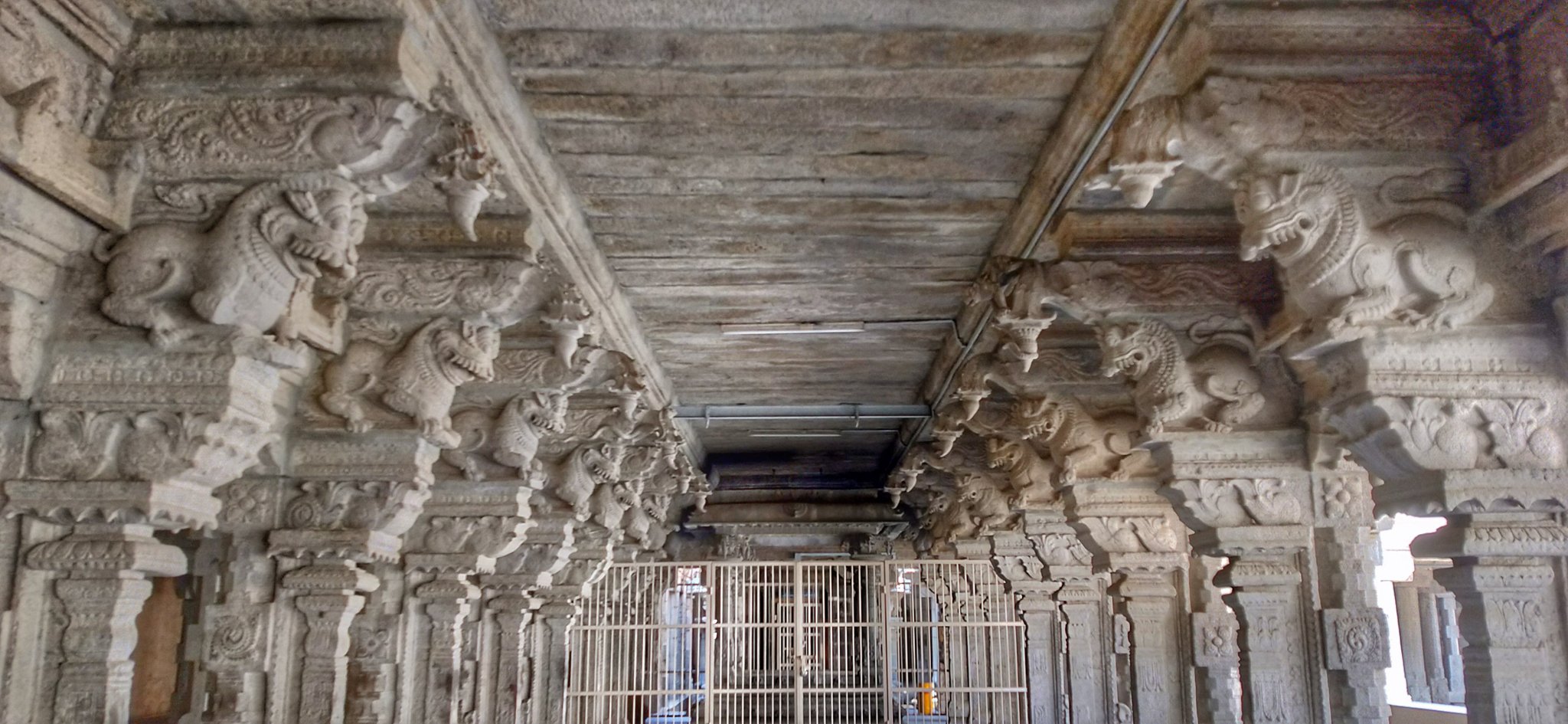 |
| Mantapam pillars |
The very ornate Kalyana Mantapam with very ornate pillars & life size sculptures of patrons of the Temple. These were later additions by the Nayakas of Madurai. A place for Veda parayana, Hari katha & various other cultural performances.
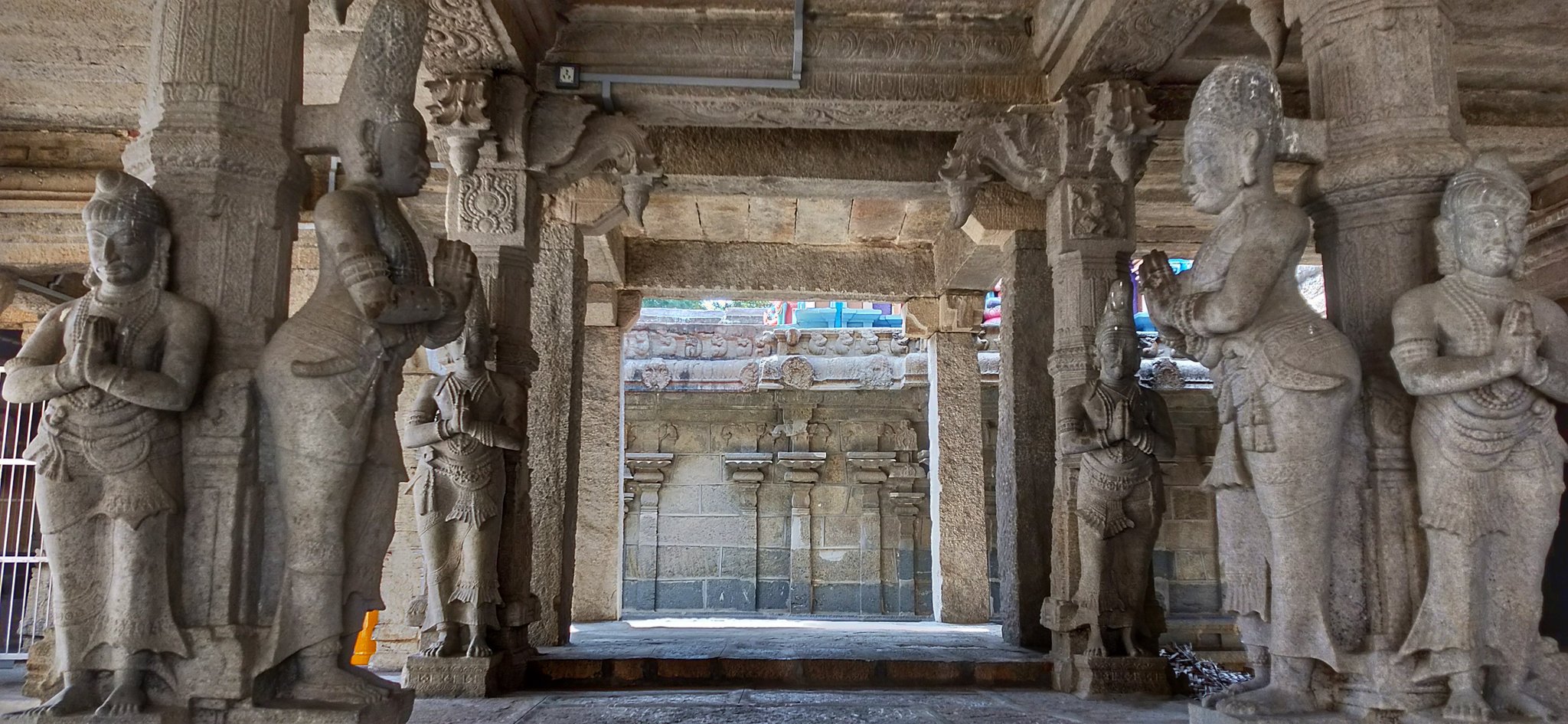 |
| Kalyana Mantapam |
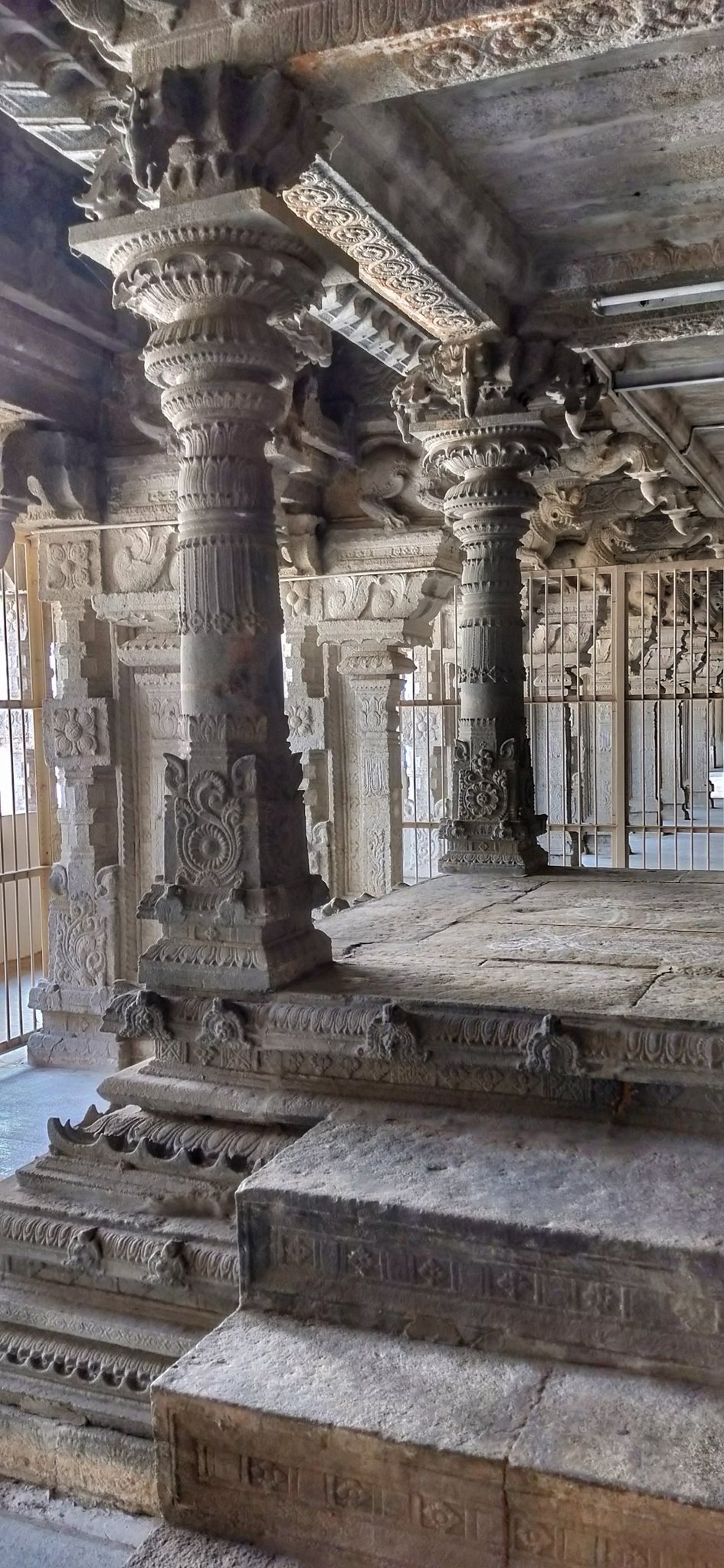 |
| Kalyana Mantapam pillars |
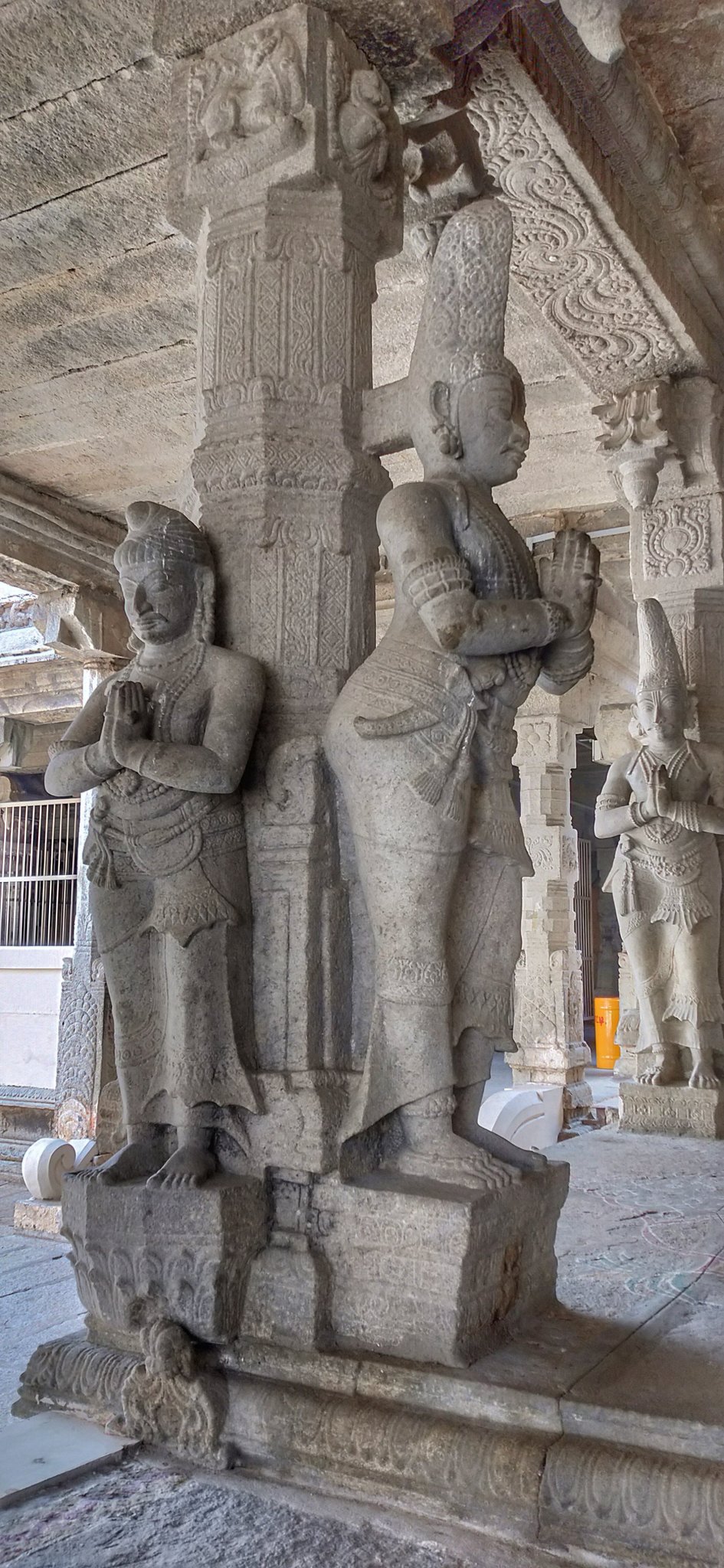 |
| Life sized carvings |
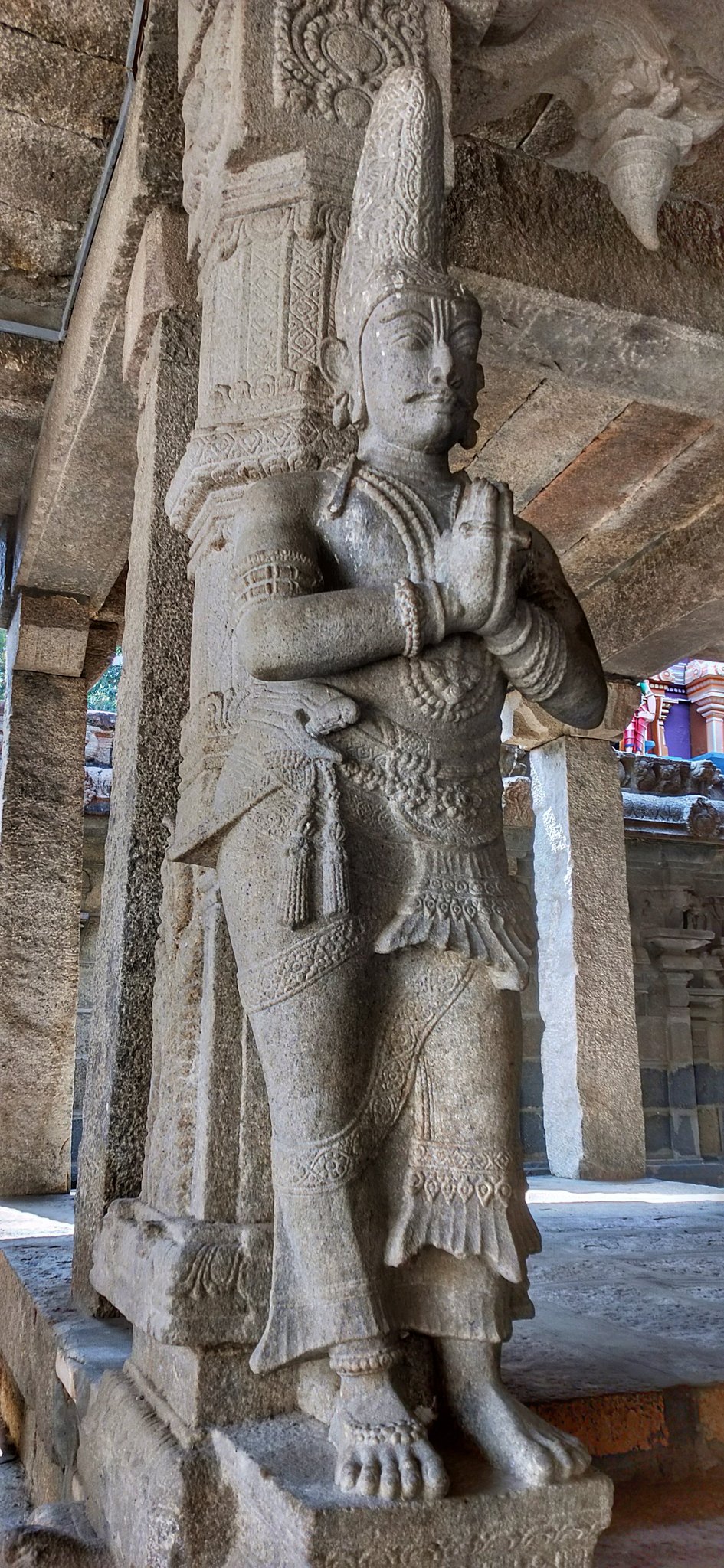 |
| Nayaka patron |
The Devi here is known as Vaikunta Nayaki & she has a separate gudi in the north side of the Temple.
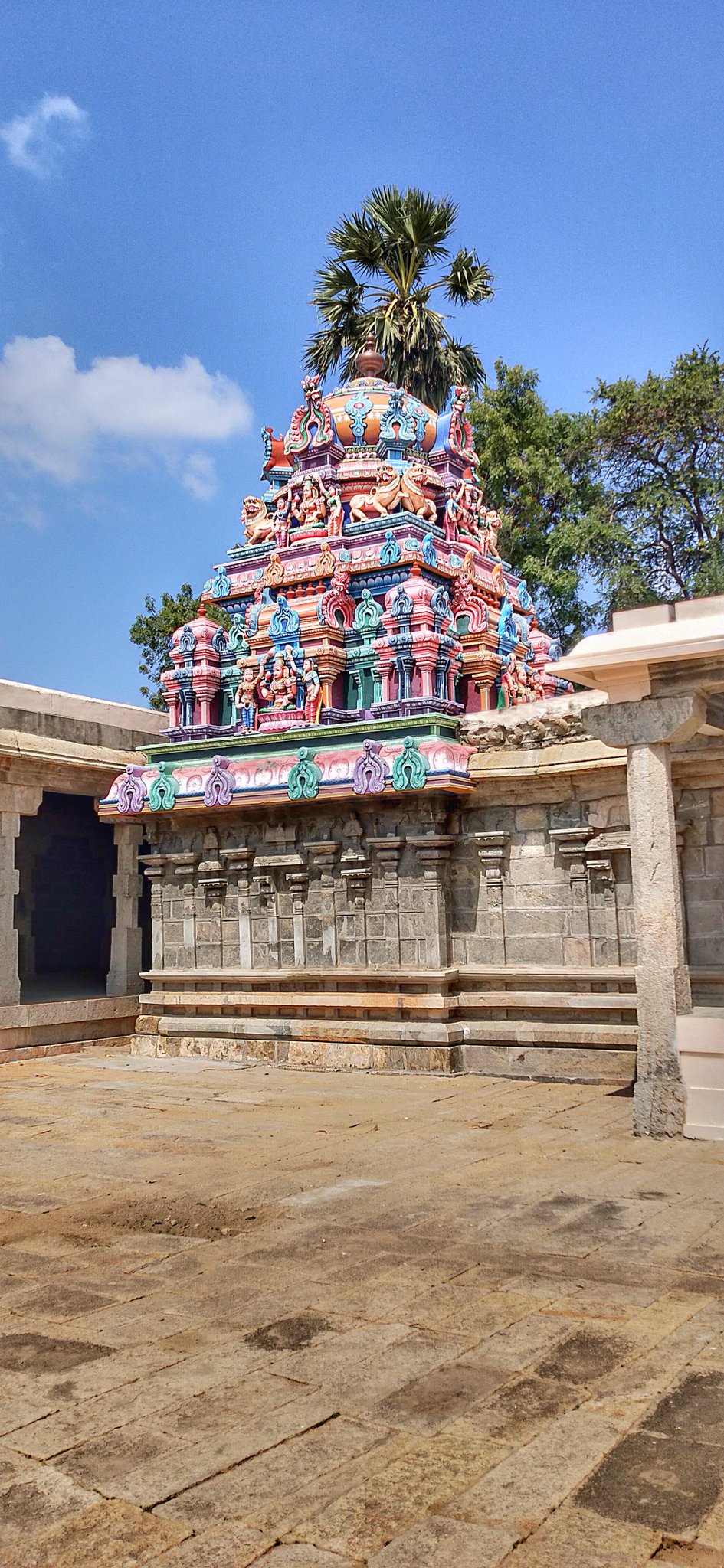 |
| Vaikunta Nayaki Thayar |
The Srivaikuntam Temple is also one among the few Temples that actually have stone murthis of Dashaavatara of Maha Vishnu. I couldnt capture them all in a single shot.From left
1)Matsya
2)Kurma
3)Varaha
4)Narasimha
5)Vamana
6)Parashurama
7)Rama
8)Balarama
9)Krishna
10)Kalki
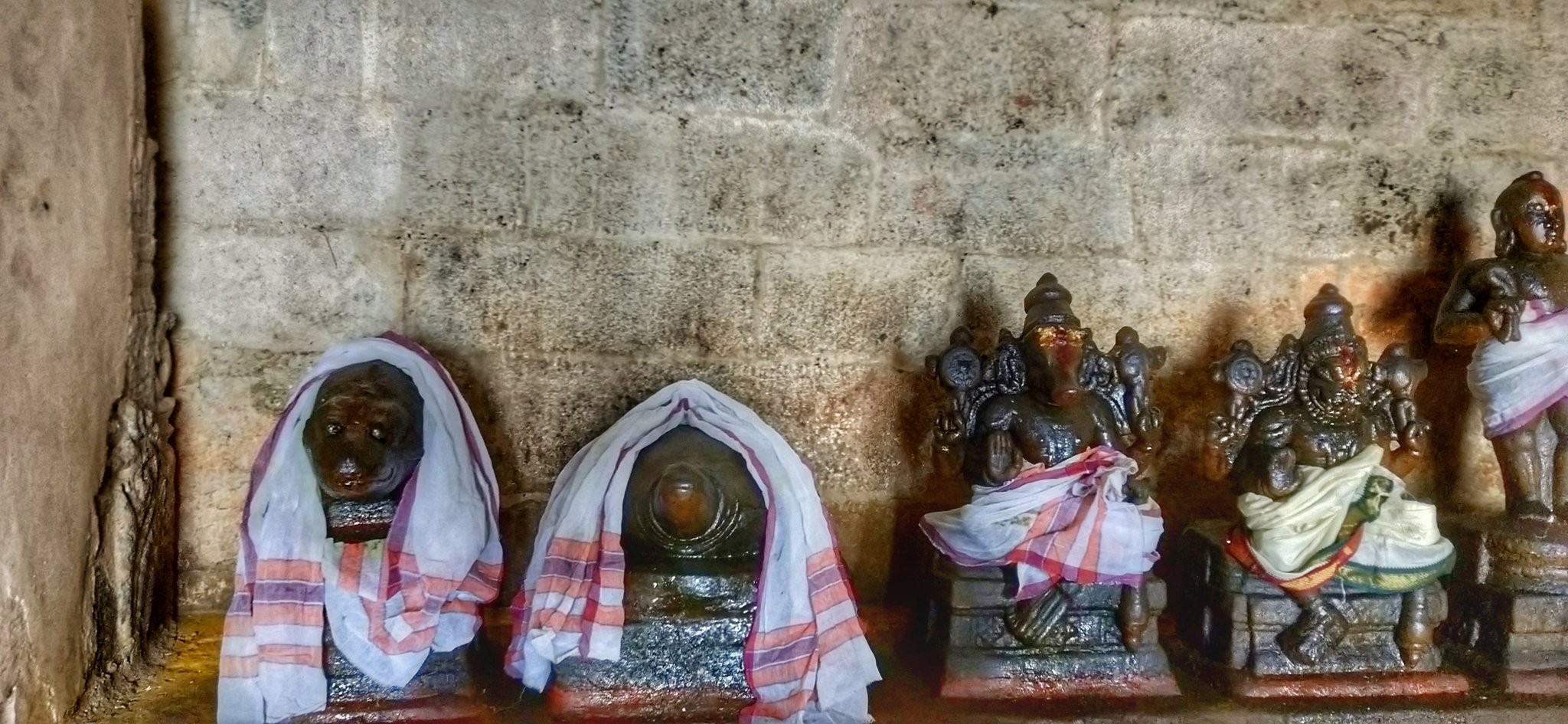 |
| Matsya, Kurma, Varaha, Narasimha, Vamana |
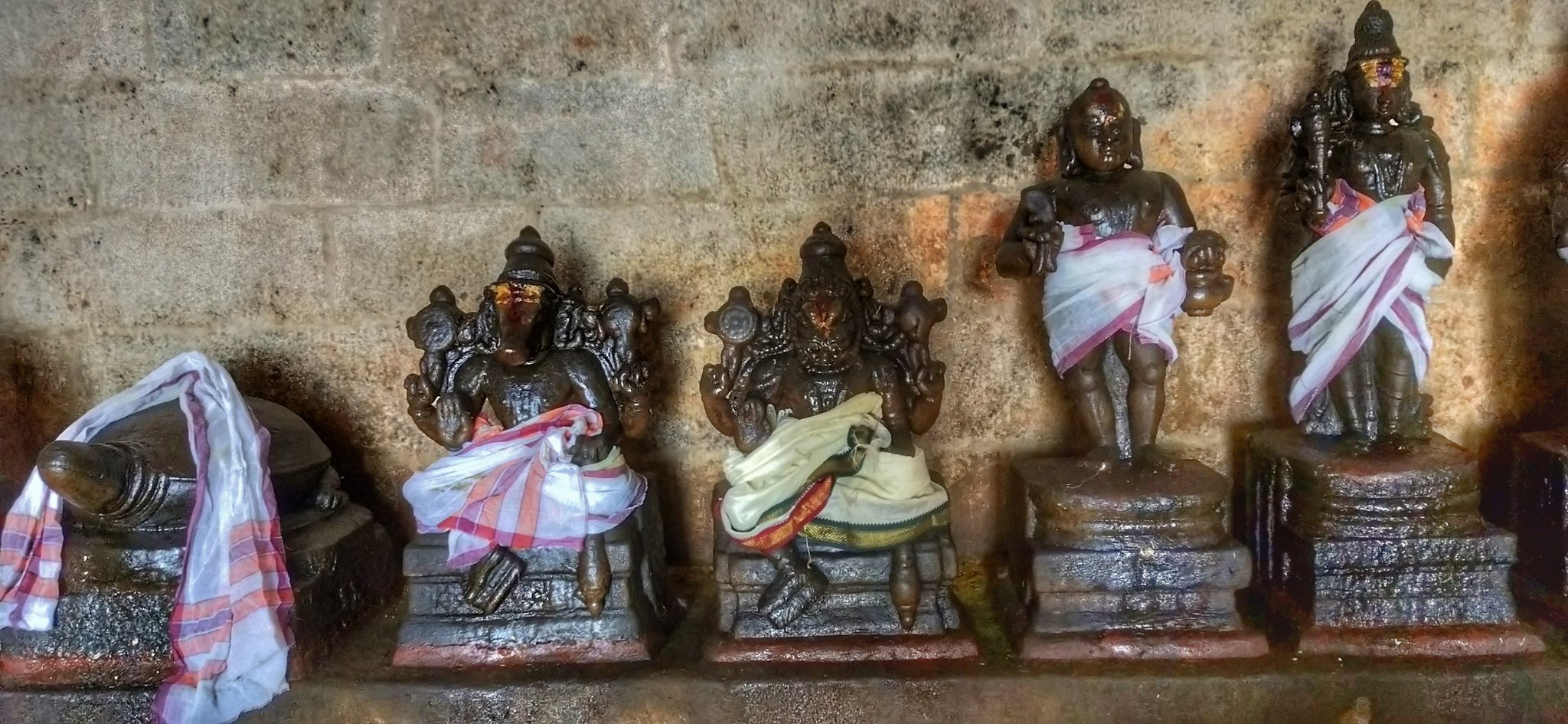 |
| Kurma, Varaha, Narasimha, Vamana, Parashurama |
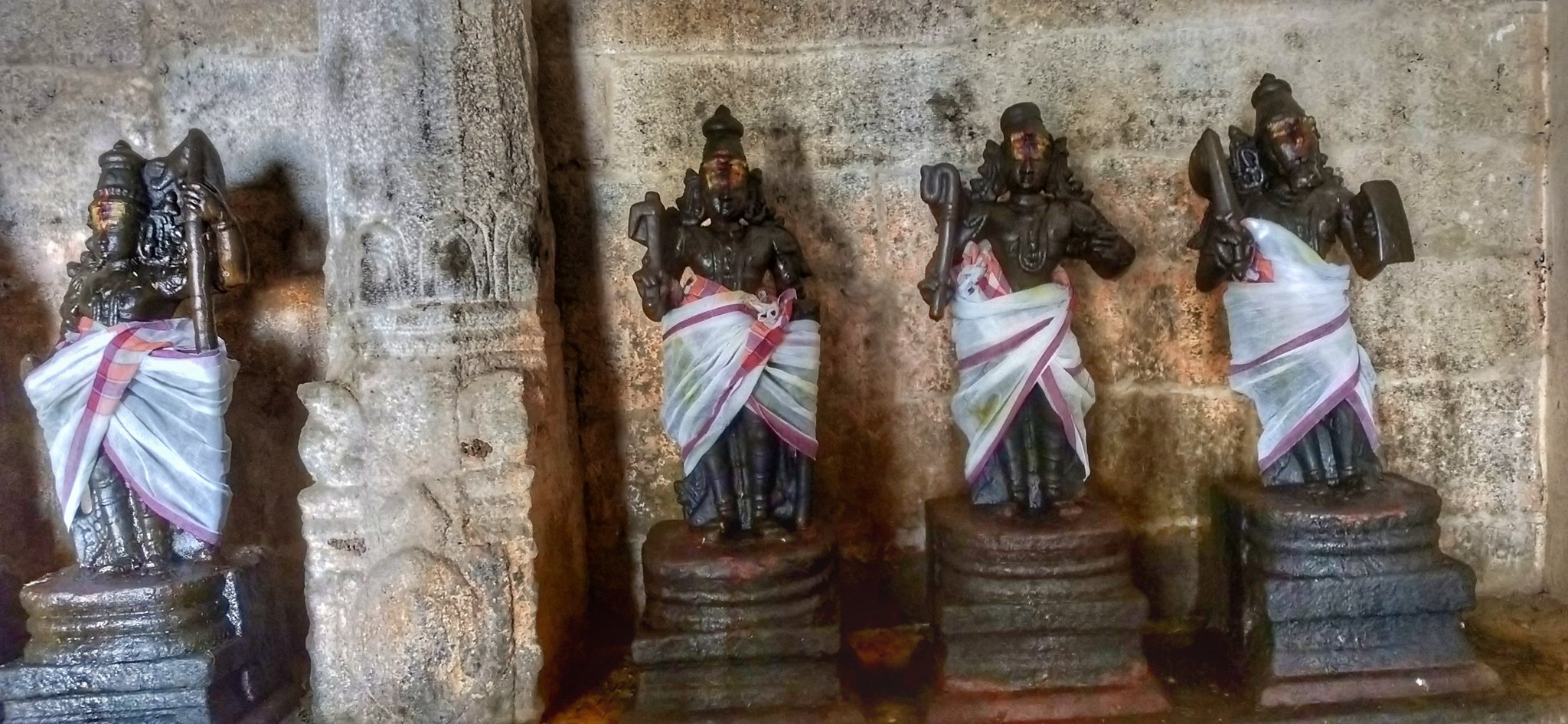 |
| Balarama, Rama, Krishna & Kalki |
Now we'll have a look at one of the most amazing aspects of the Vaikuntanathar Temple. Its the Thiruvengadamudayan mantapam which is home to some of the most beautiful life size carvings. It was commissioned by the Nayakas of Madurai in the late 15th century.
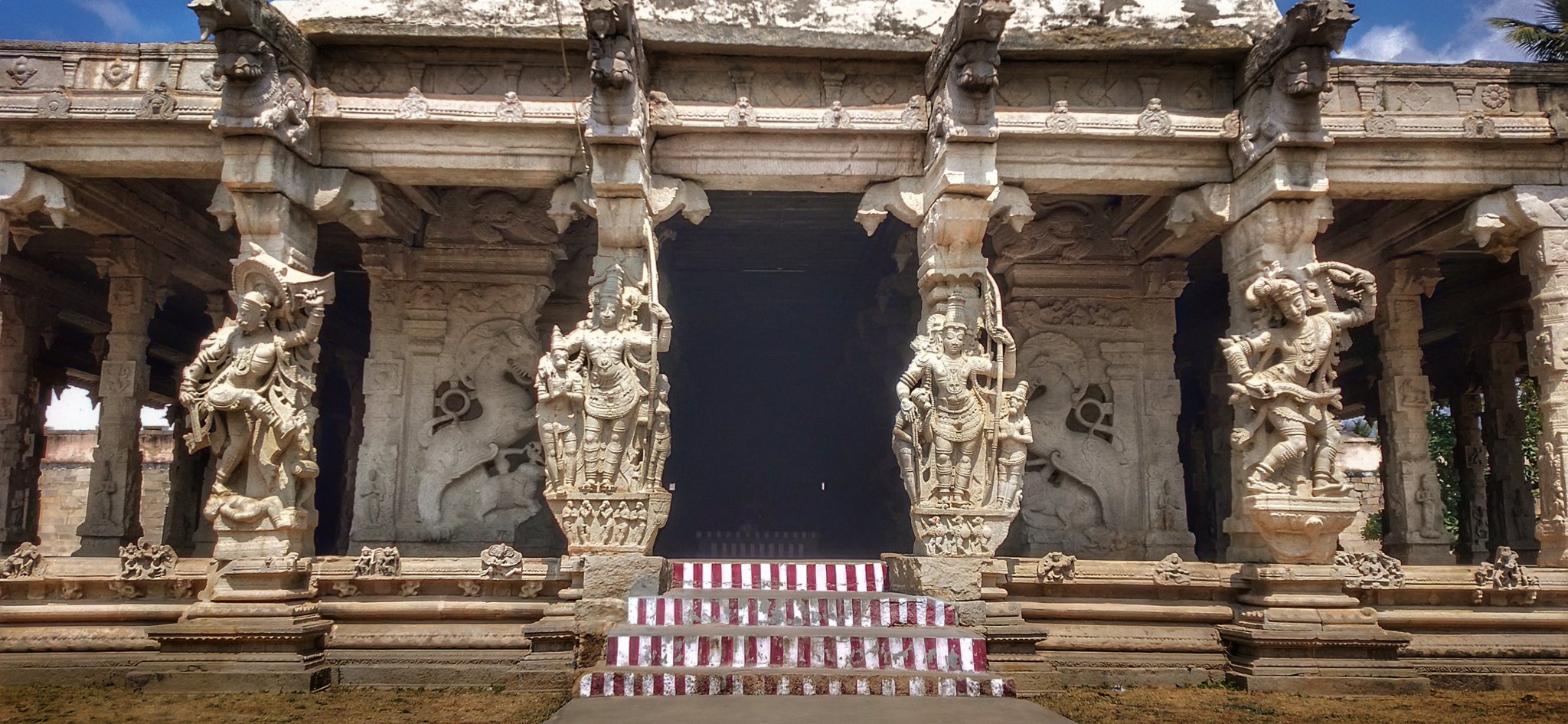 |
| Thiruvengadamudayan mantapam |
There are 4 life sized carvings on the pillars of the mantapam. Seen here is Shri Lakshmana with his kodanda embracing Sugreeva. Notice how Lakshmana's right hand is ever so gently resting on Sugreeva's shoulders. Also notice Lakshmana is wearing padaraksha(footwear).
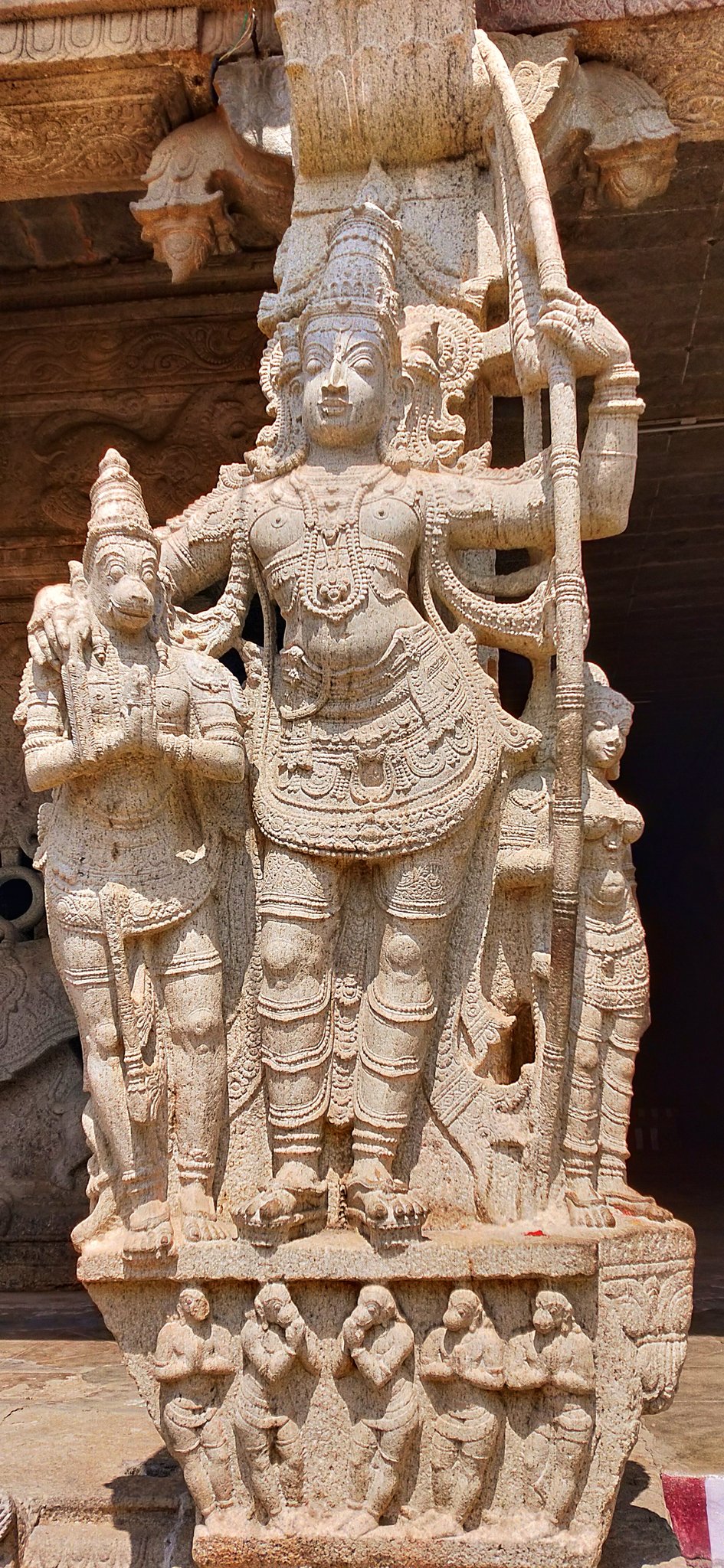 |
| Lakshmana & Sugreeva |
From the adjoining pillar is a carving of Shri Rama, Hanuman & Angada. Rama is gently embracing Hanuman with his right palm. Observe the reverence shown by Hanuman (left hand covering his mouth). Such is his Bhakti towards Rama. Angada looks on with folded arms.
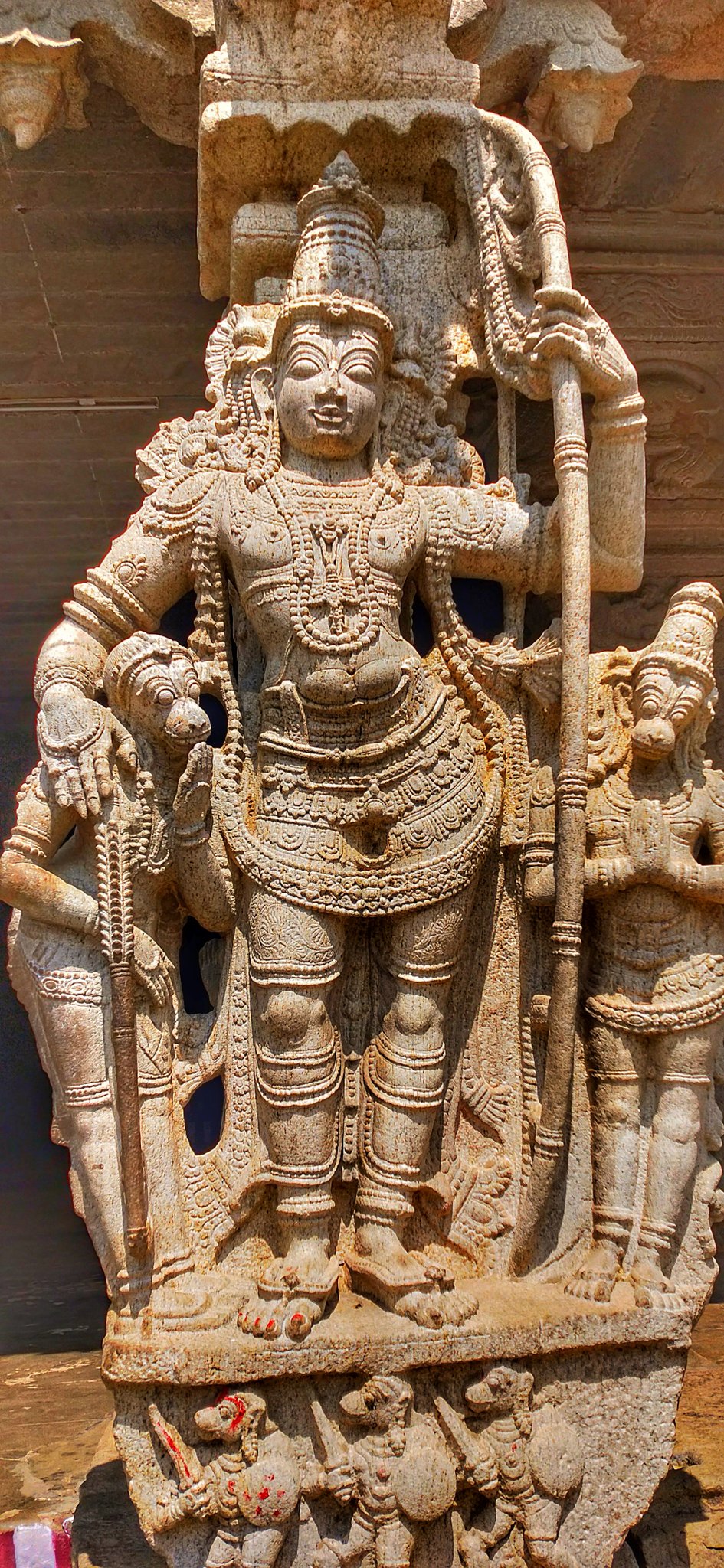 |
| Shri Rama,Hanuman & Angada |
Fierce looking carving of Aghora Veerabhadra. He wields a khadga(sword) & a khetaka(shield). He furiously stamps over Daksha. Pay attention to the veins on his raised right leg! Such was the attention to detail. This style of carving was popularized during Vijayanagara rule to invoke the warrior spirit. It was this spirit that led to Hindu reconquest of Madurai.
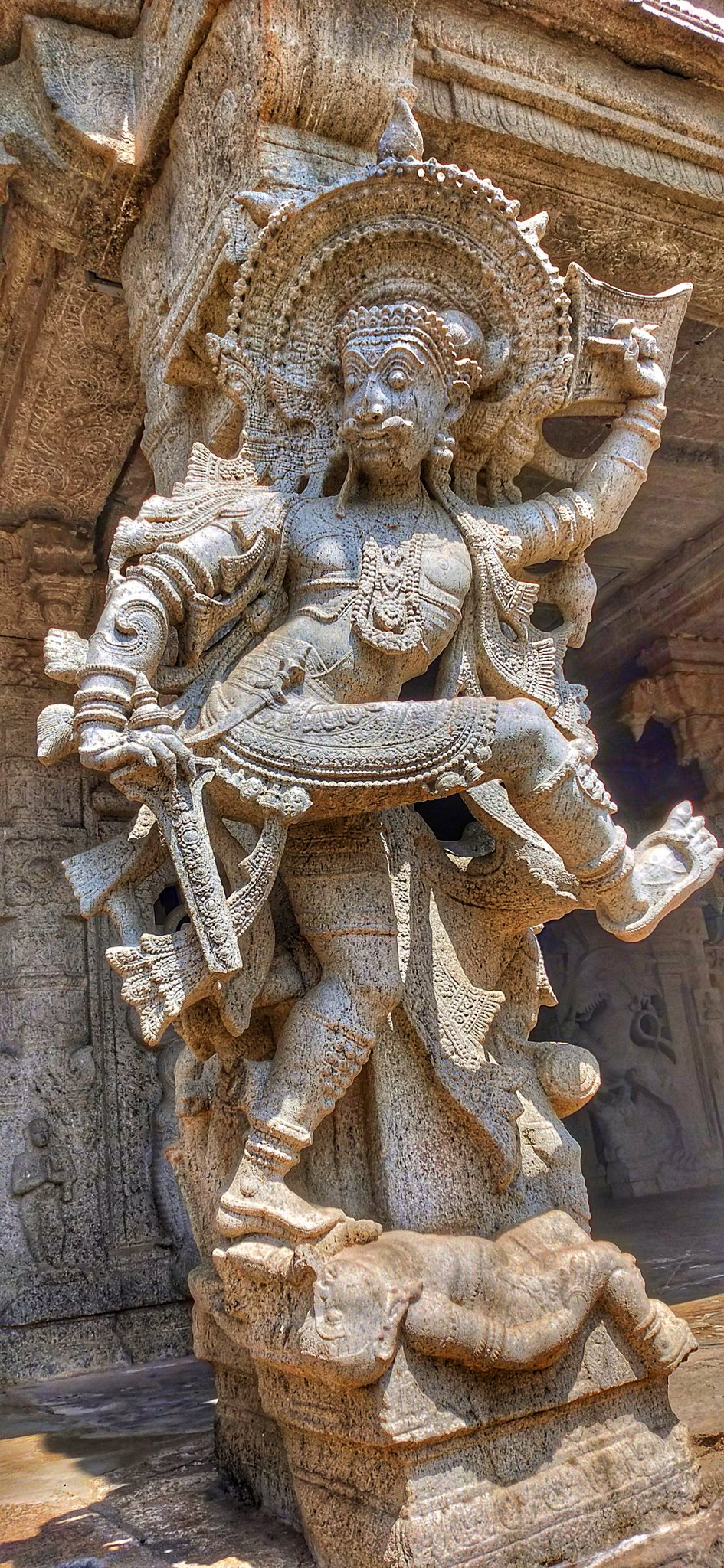 |
| Aghora Veerabhadra |
 |
| Visible Veins on the leg |
Carving of a Kshatriya warrior who is believed to be Arjuna. There is a similar carving (exact pose, exact facial features, same weapons) on one of the pillars at the Srivilliputhur Andal temple.
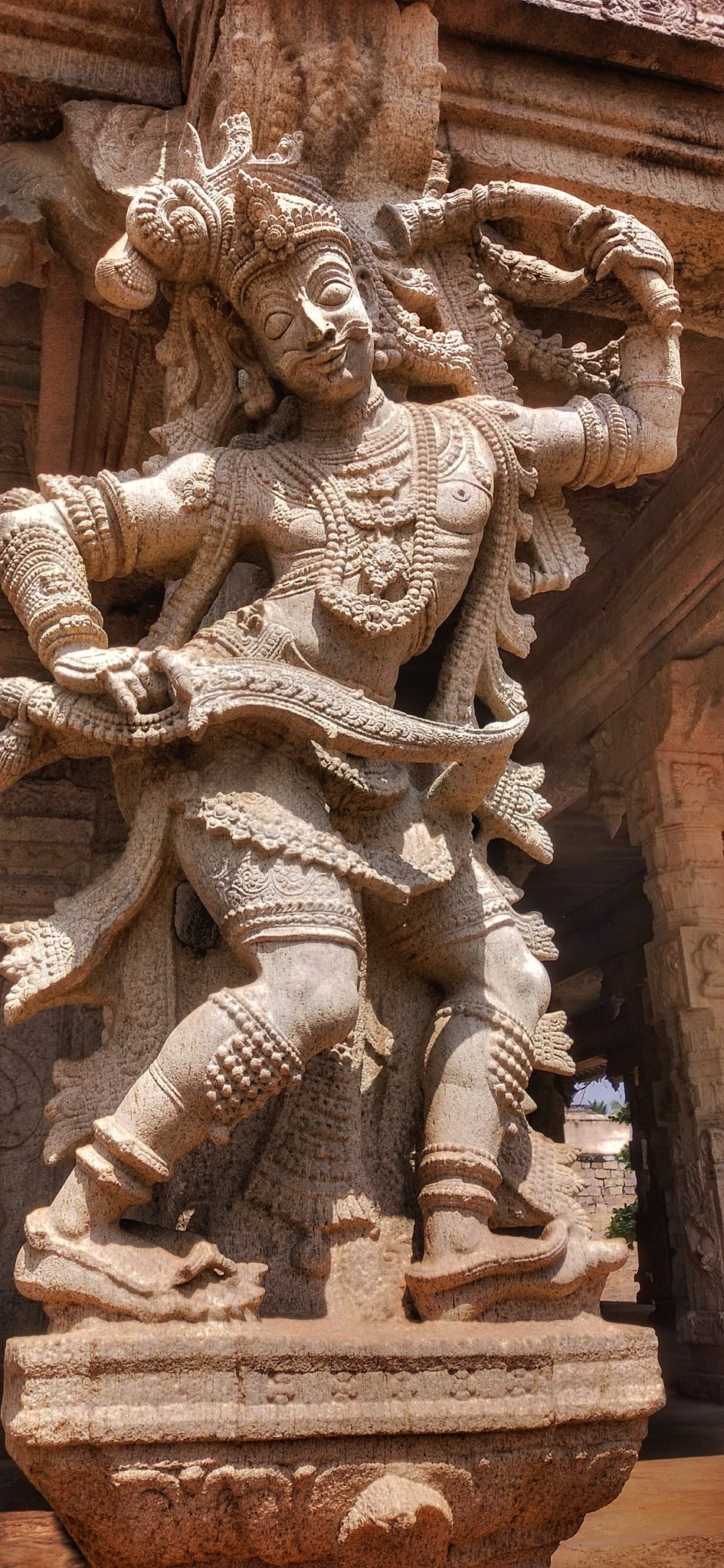 |
| Arjuna |
The Mantapam had a total of 18 gigantic Yali carvings. 9 on each side. Yali carvings along with the warrior carvings became more prominent after Vijayanagara rulers liberated Southern Bharat from brutal islamic occupation. Yalis came to represent the fighting spirit of Hindus.
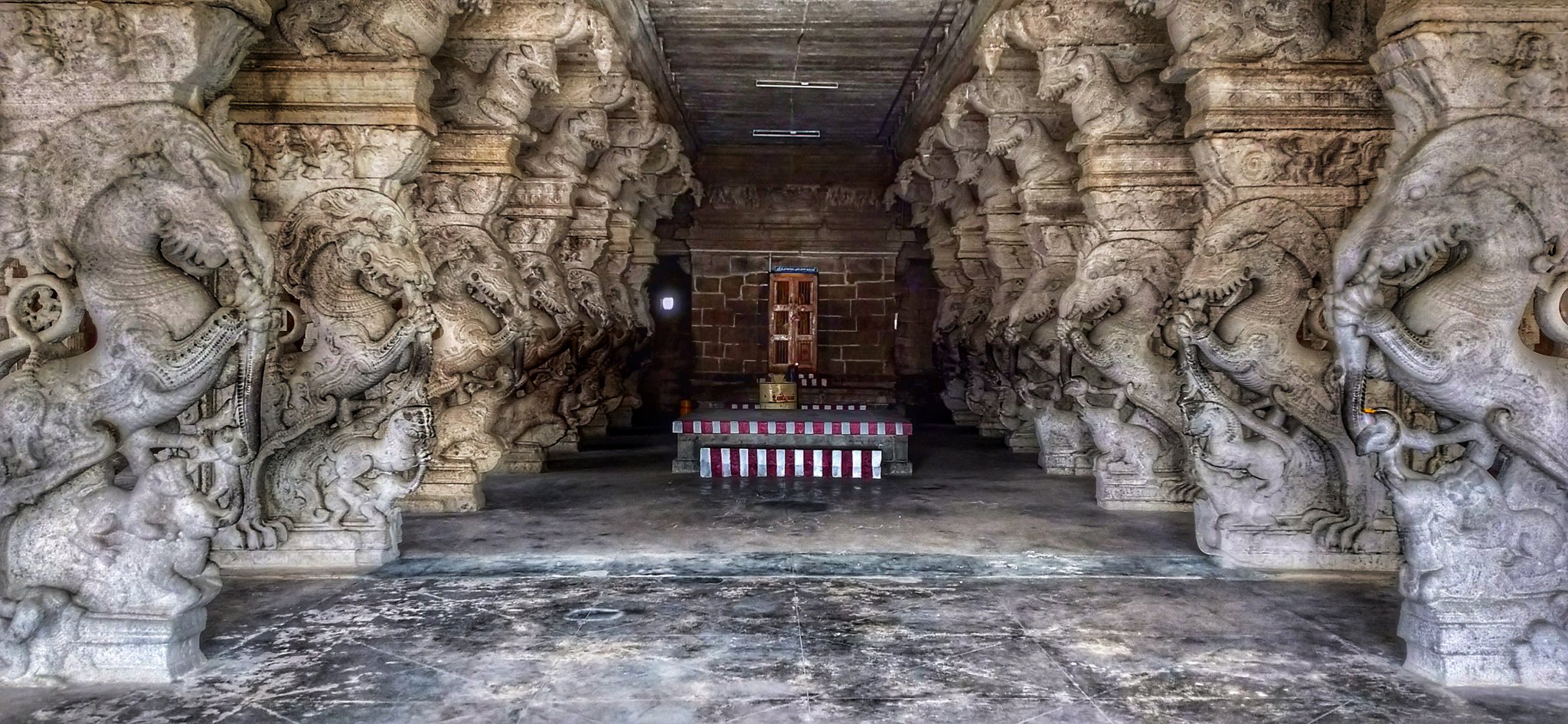 |
| 18 Yali pillars at the Thiruvengadamudayan mantapam |
While Yali carvings were always a prominent feature of Temples, they were depicteded with intense ferocity in Temples restored by Vijayanagara rulers. A Yali is supposed to represent immense strength, ferocity & agility. The combined strength of an Elephant, a Lion, a Horse.
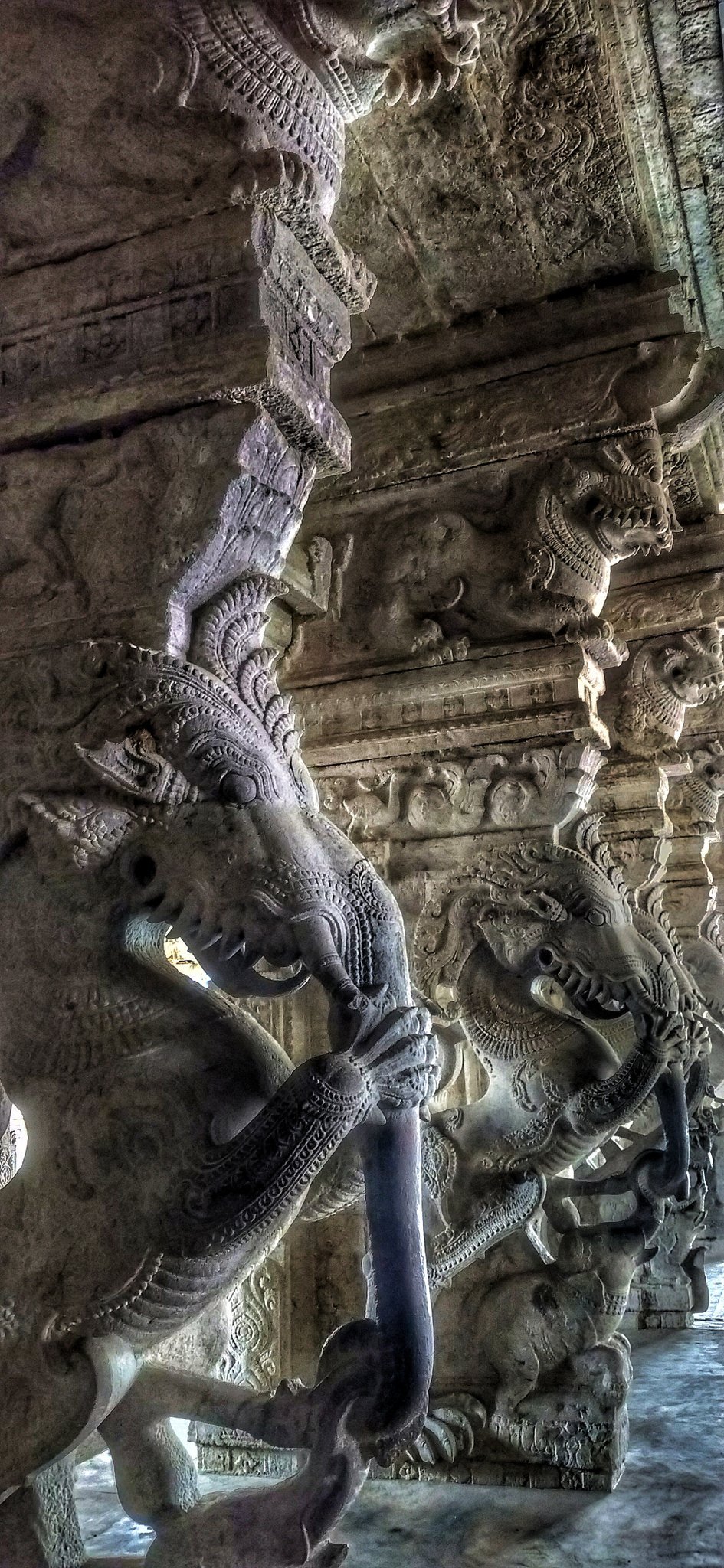 |
| Yali |
I find Yali carvings as one the most fascinating aspects of Temples. Quite mind blowing how the sculptors paid attention to even the minutest of details. Also these are not just sculptures, they along with the pillar bear a part of the ceiling load. Engineering marvel!
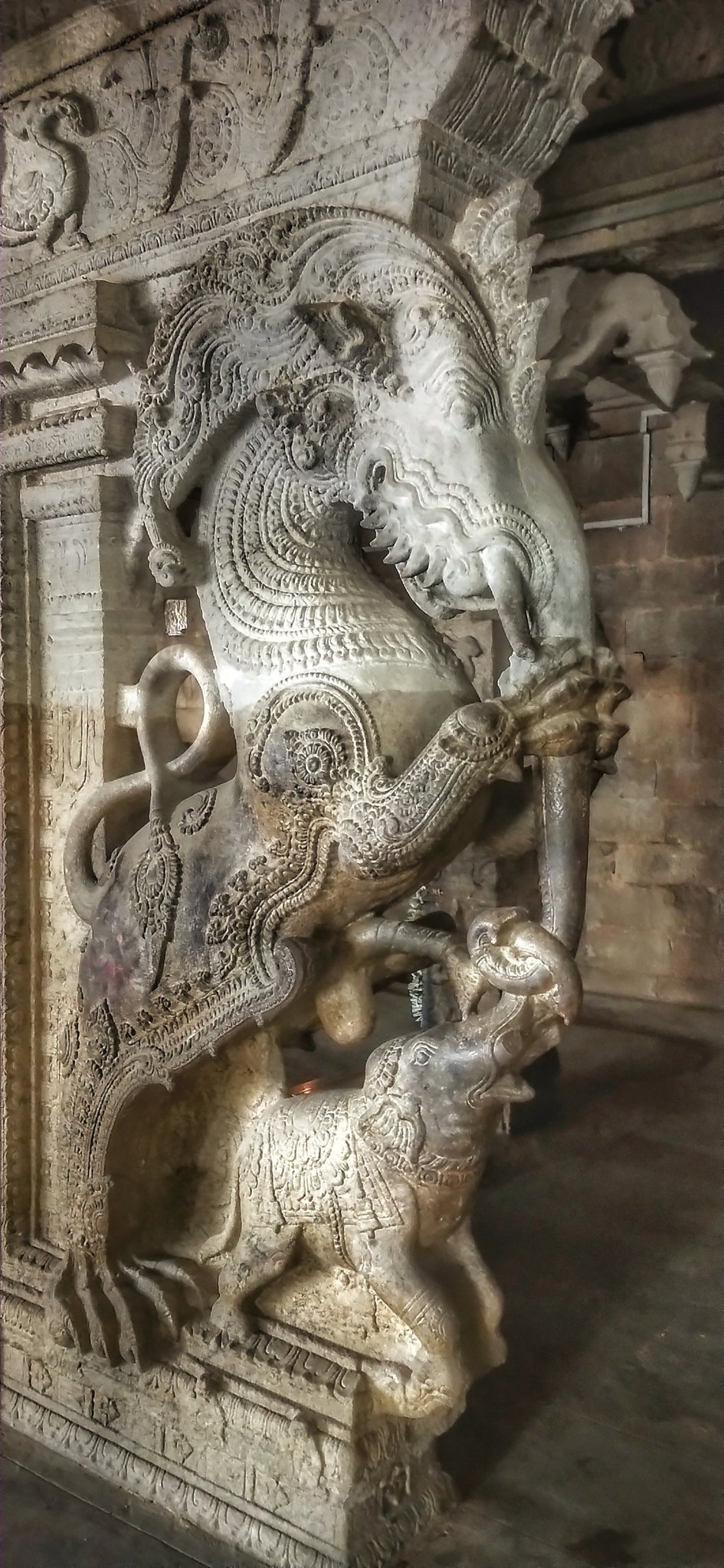 |
| Yali |
A look at few of the pillar carvings from the mantapam.
1) Vanaras carrying stones to build the Sethu (bridge) to Lanka.
2) Arjuna performing penance to Shiva which leads him to getting the Pashupatasthra weapon.
3) A Vaishnava Acharya
4) A Lion & a bird.
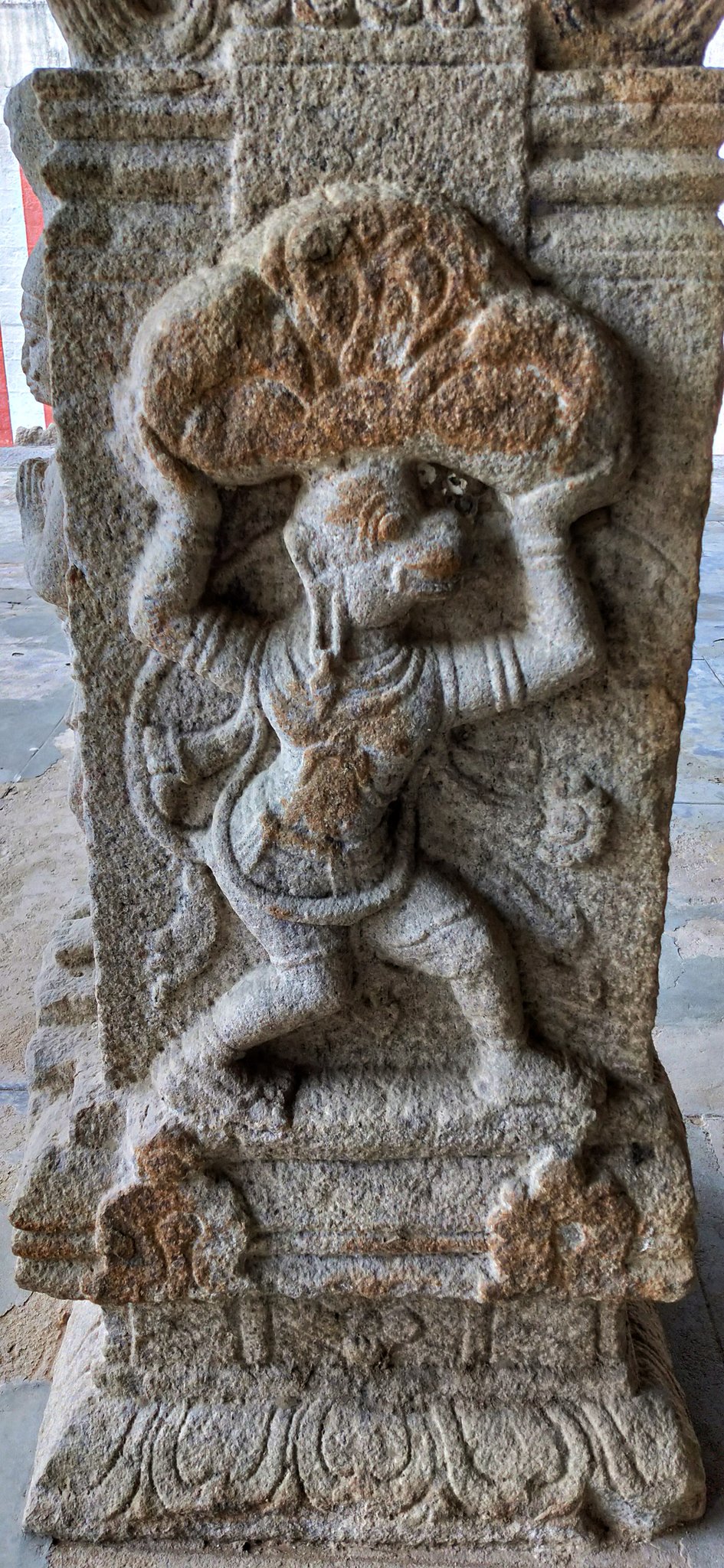 |
| Vanara building the Setu to Lanka |
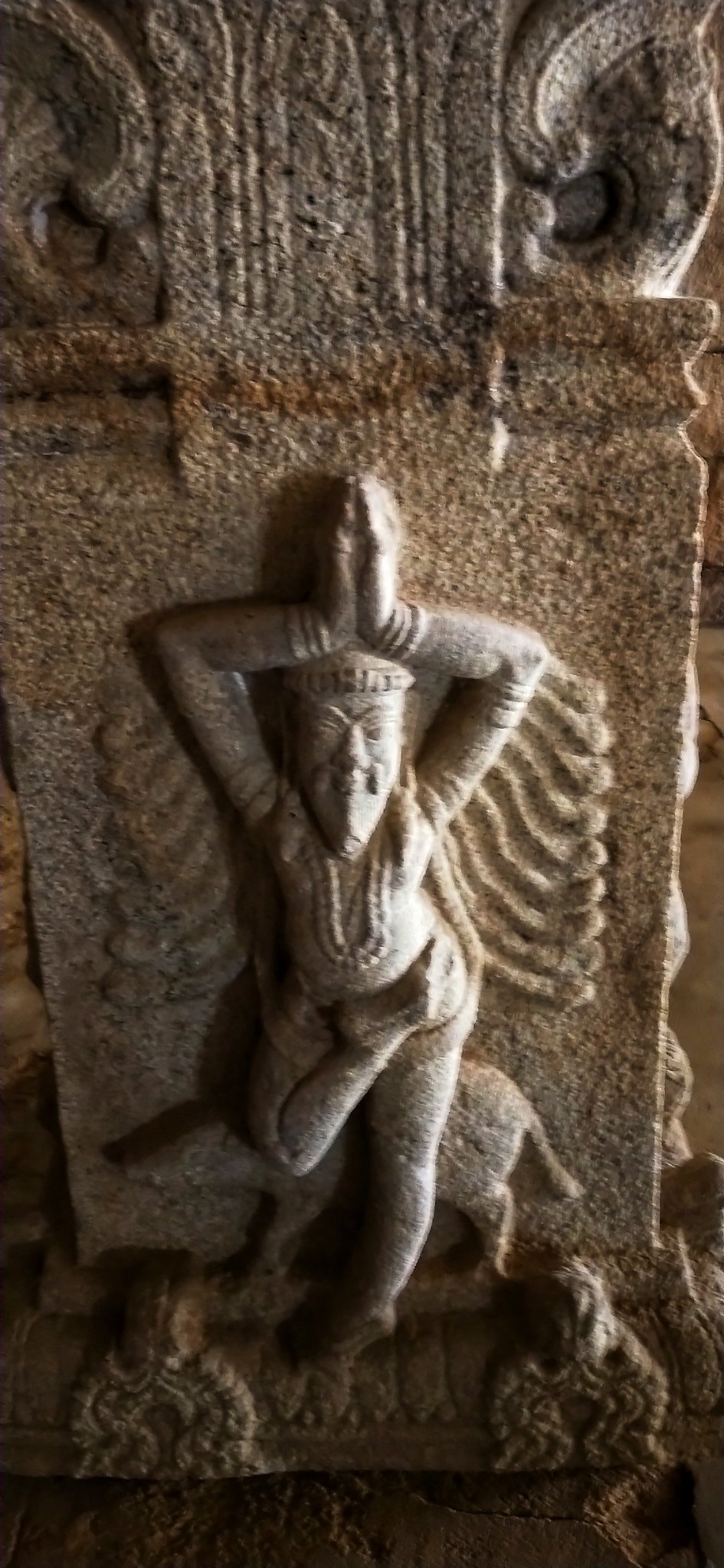 |
| Arjuna performing penance |
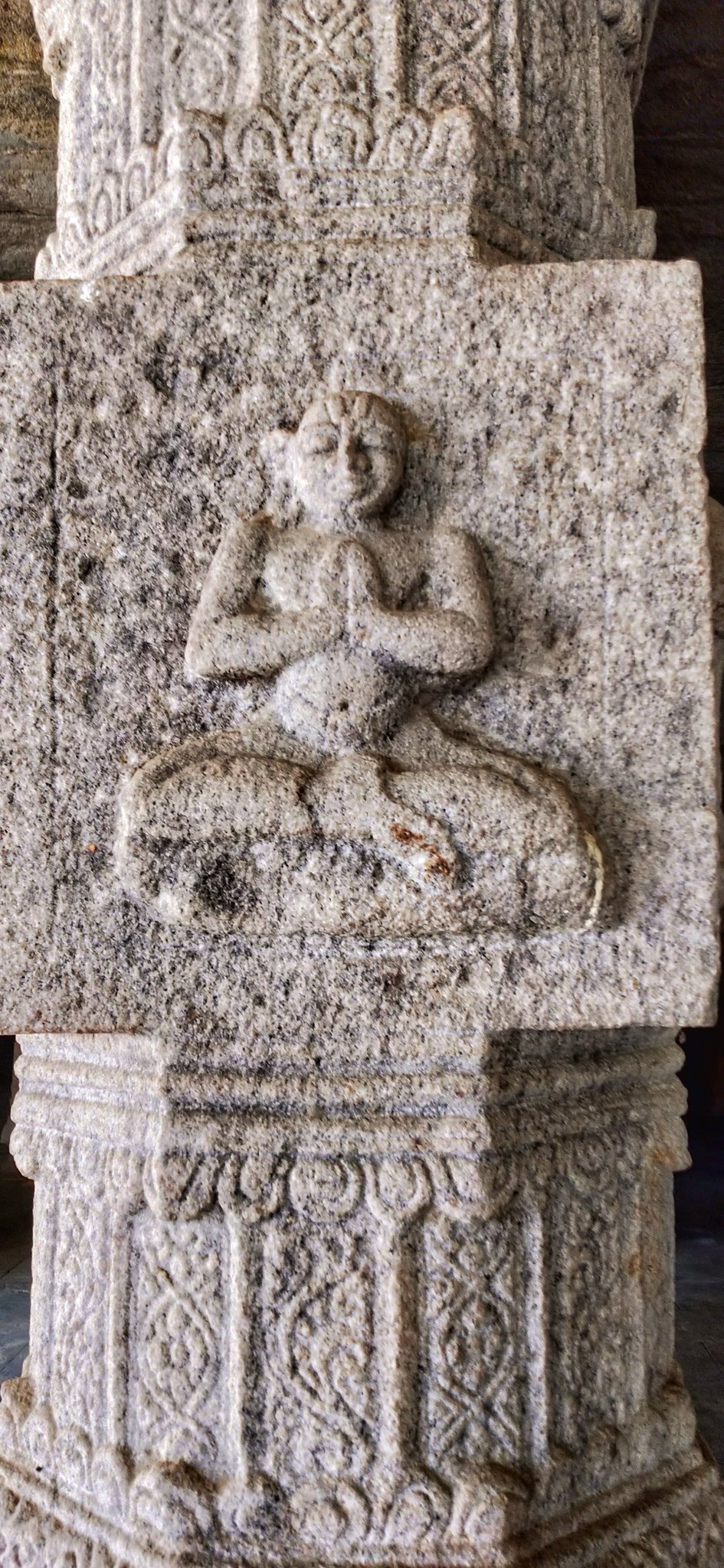 |
| A Vaishnava Acharya |
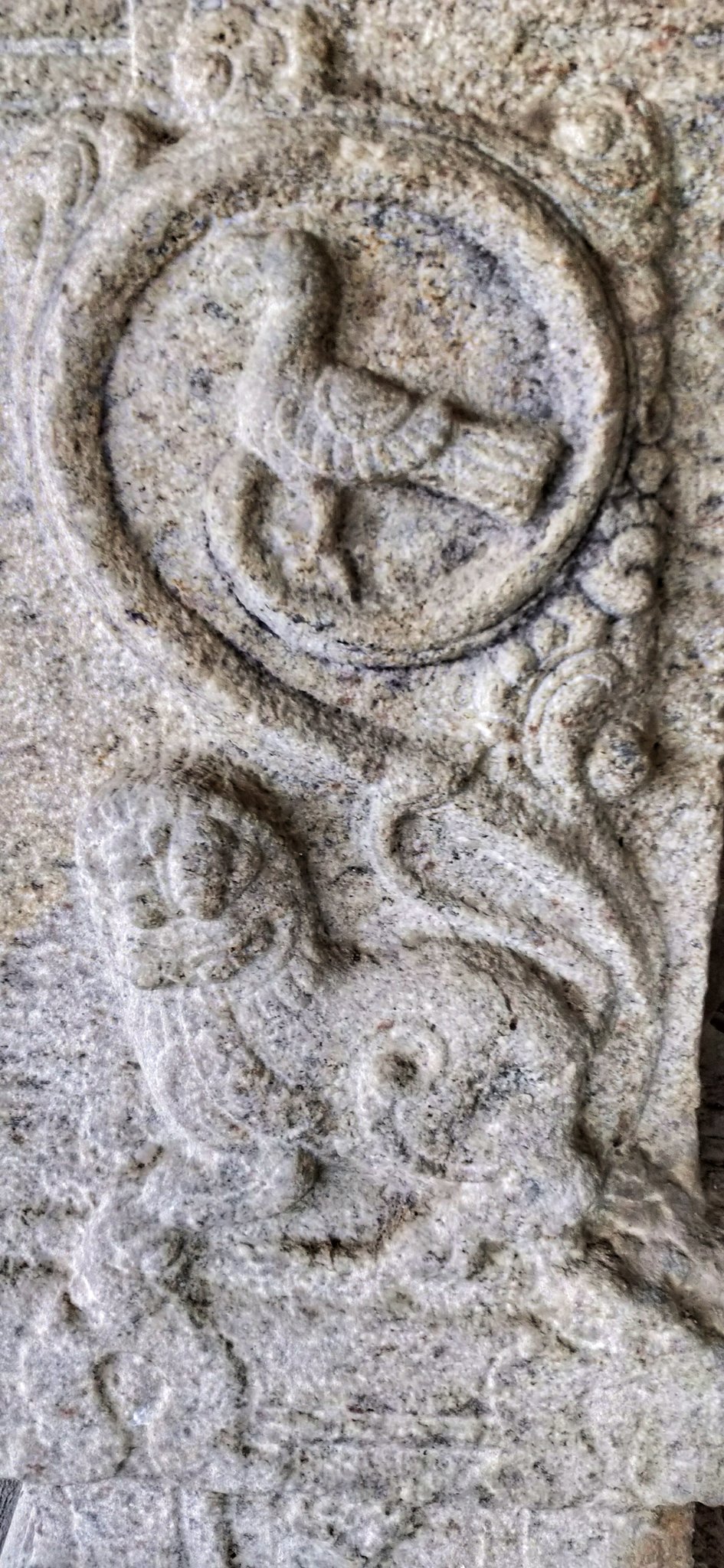 |
| Lion & a Bird |
A sculpture of Lord Krishna playing the flute surrounded by gopikas.
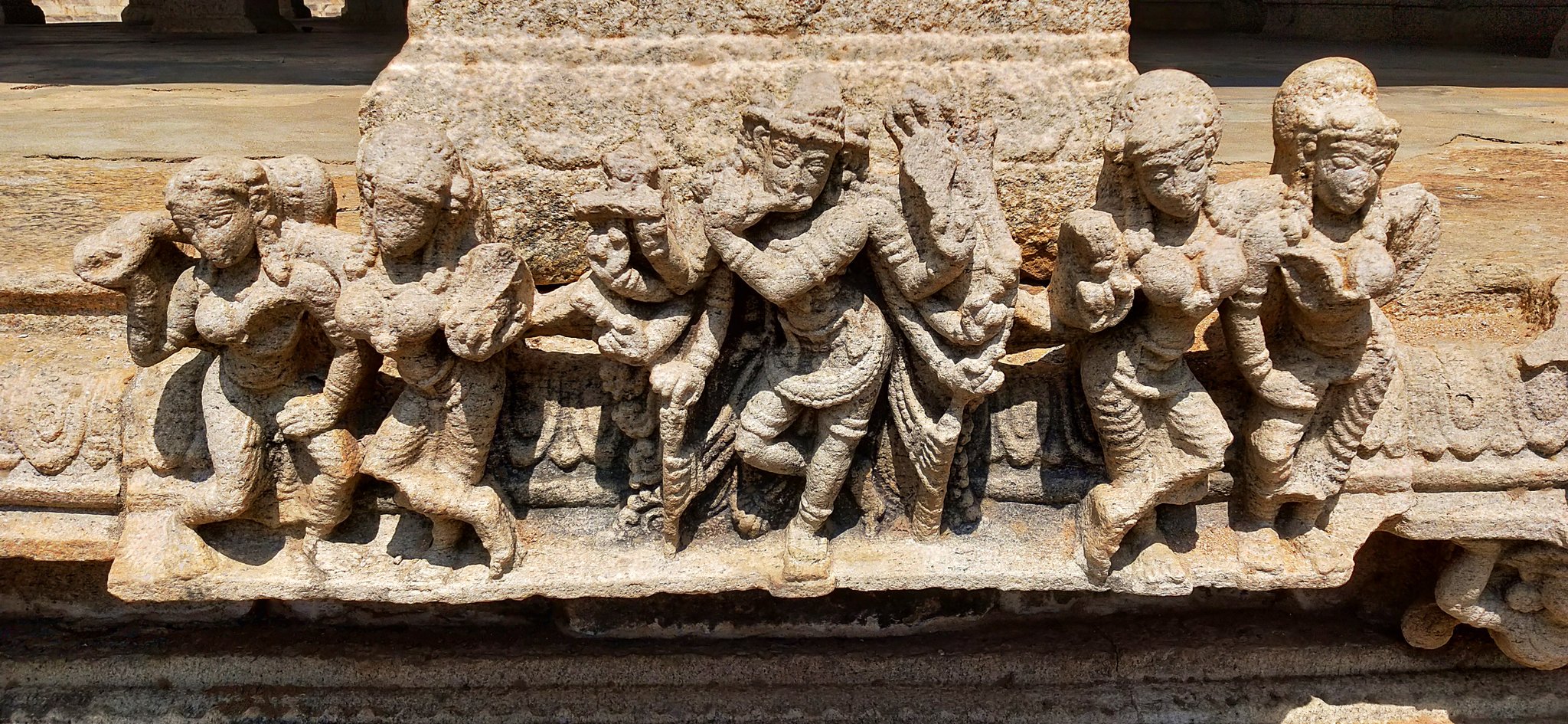 |
| Venugopala |
Now notice these sculptures. These are high relief sculptures, where more than half the mass of the sculpted figure projects outwards from the background. In this case its nearly 3/4ths of the sculpture itself. Hindus mastered this technique well before any other civilization.
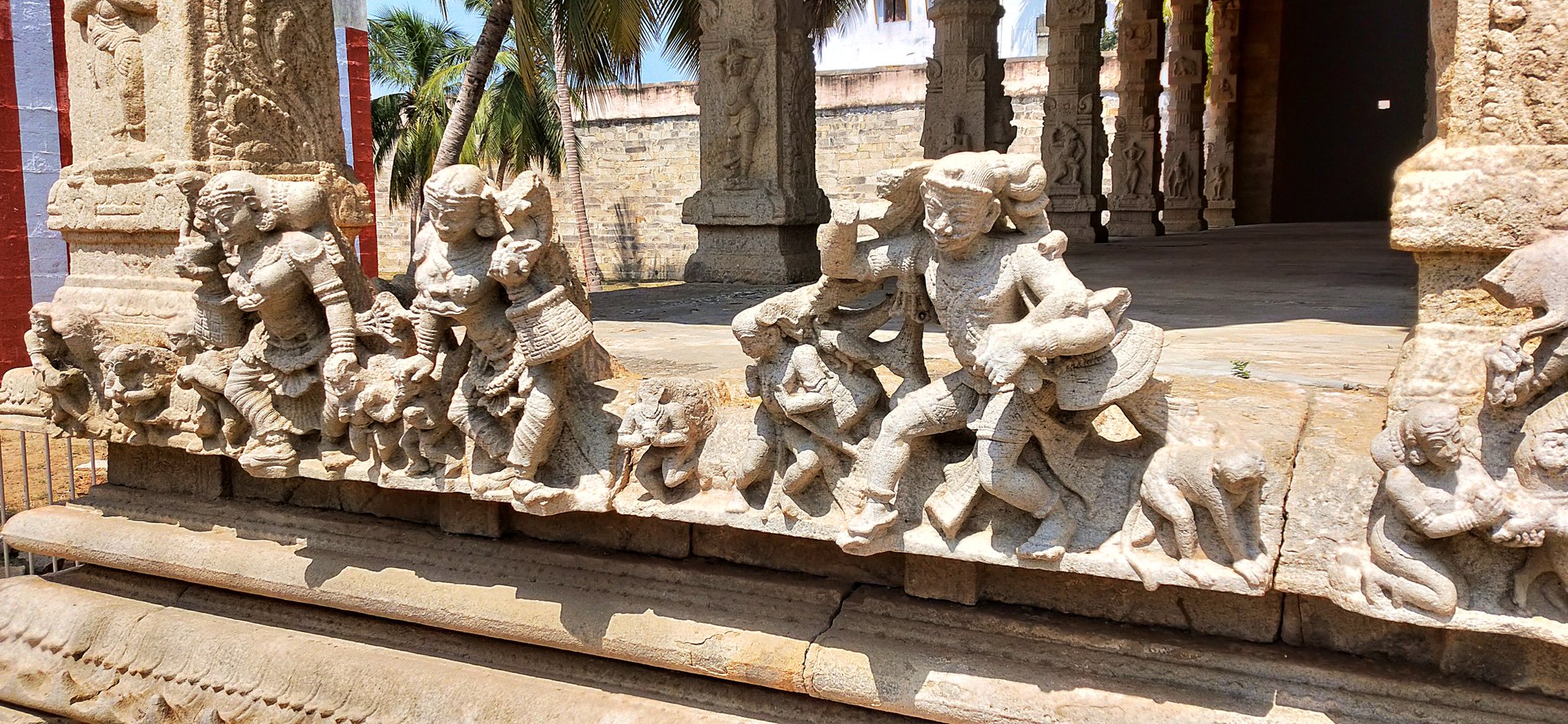 |
| high relief sculptures |
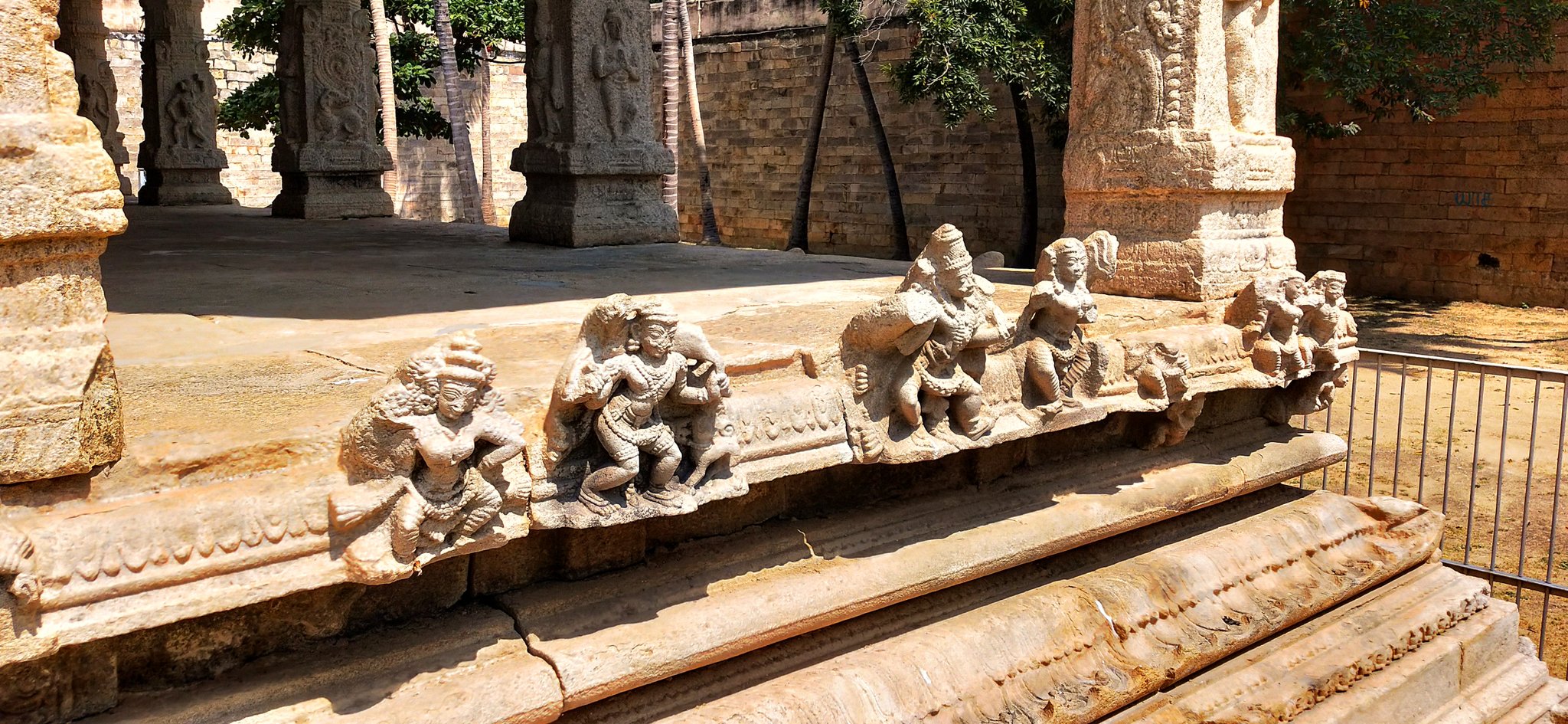 |
| high relief sculptures |
A high relief sculpture of a Gandharva playing percussion just adjacent to the Agora Veerabhadra carving we saw a few tweets back. Gandharvas are celestial beings who are also extremely skilled musicians.
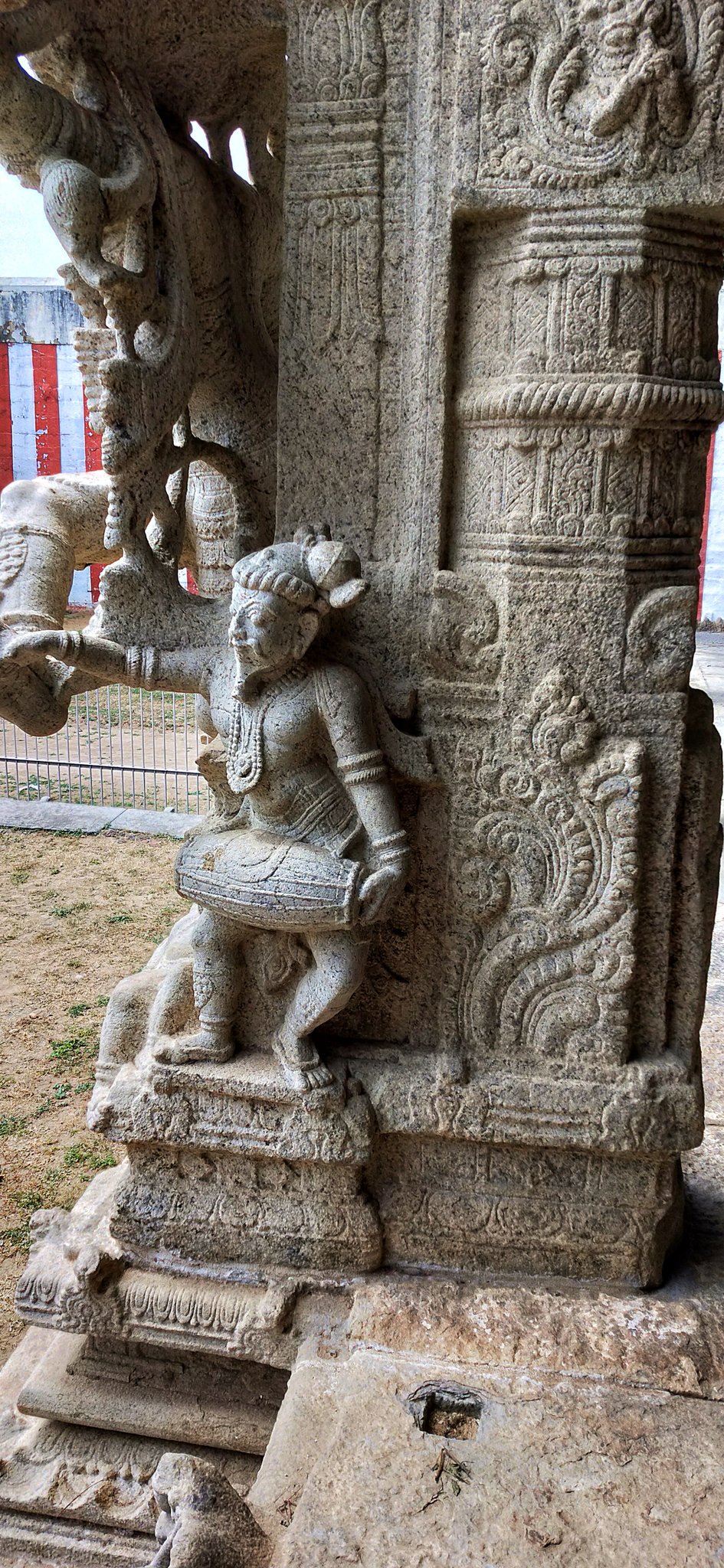 |
| A Gandharva |
A look at the smaller 2nd Gopuram from the mantapam. Notice the carving of the kondana(bow) that Lakshmana is holding with his arm.
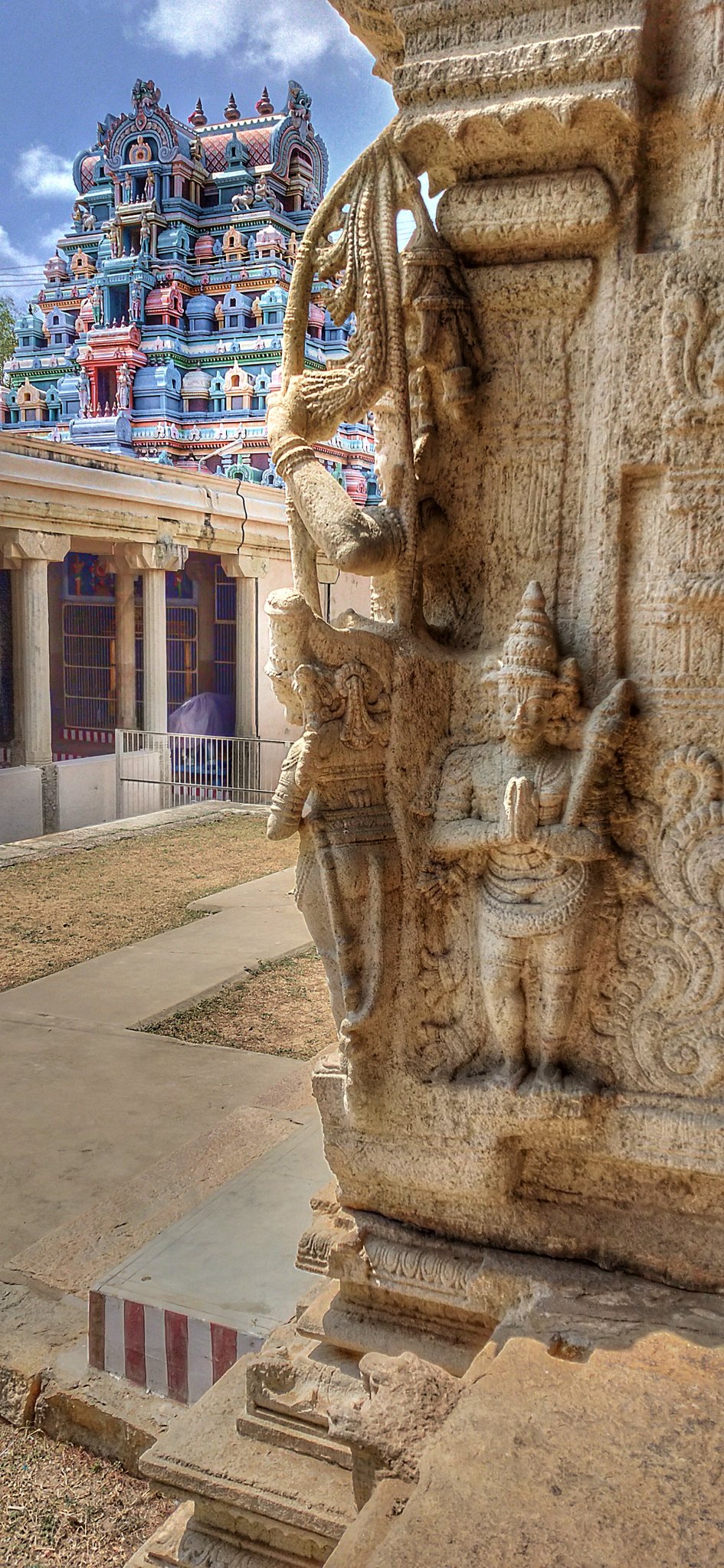 |
| 2nd Gopuram |
Pillar carving of what one can only assume to be an Apsara with long flowing hair.
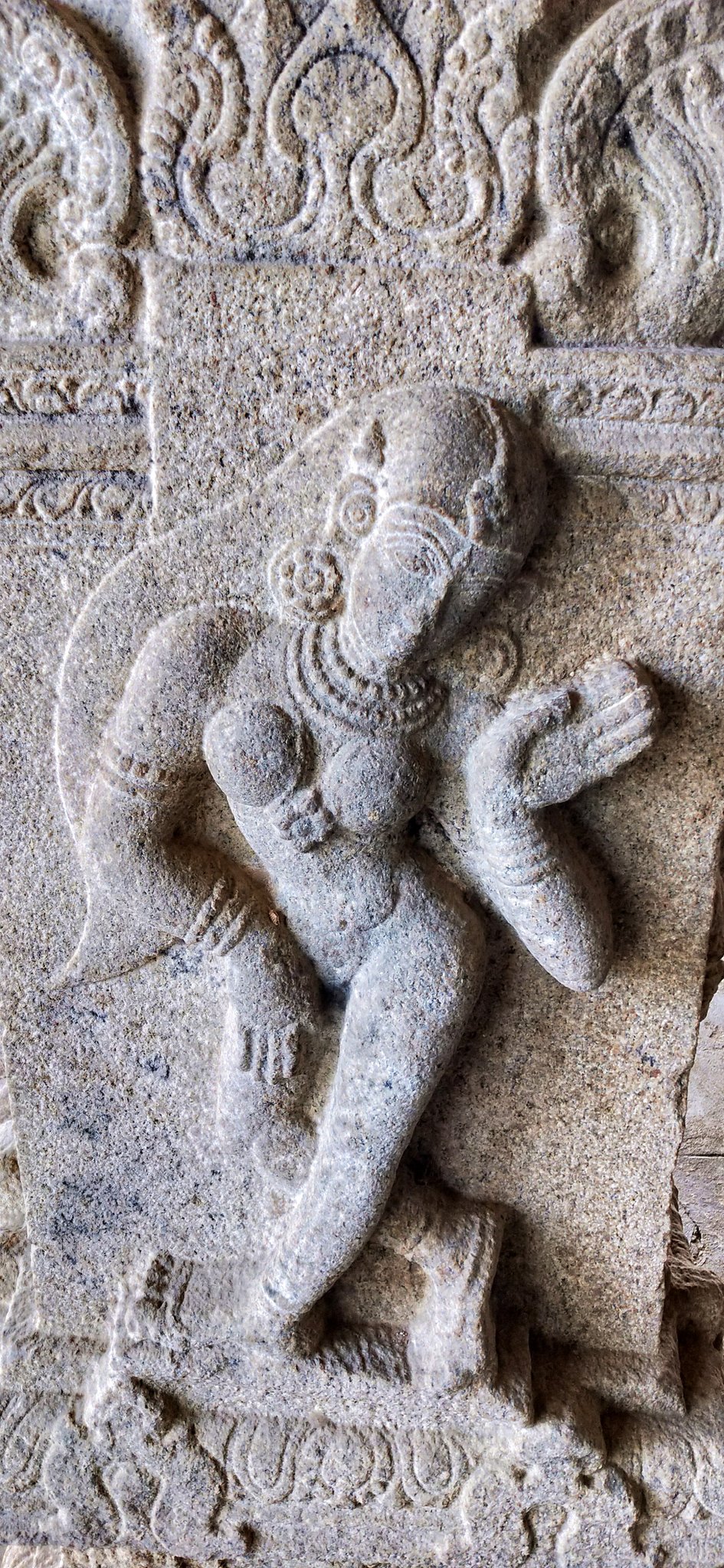 |
| An Apsara |
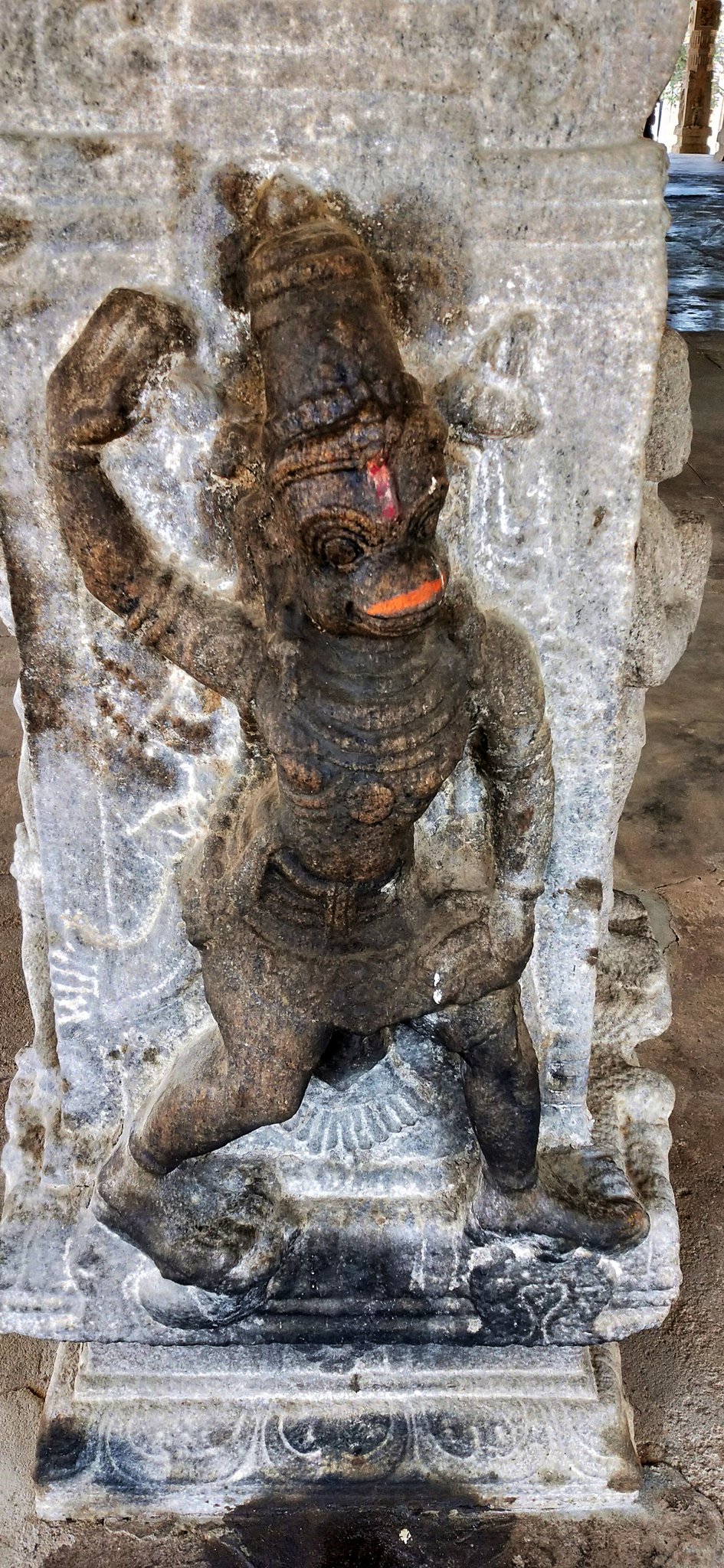 |
| Hanuman |
This is another smaller Mantapam situated just opposite to the Thiruvengadamudayan mantapam we just had a look at. This mantapam leads to Temple dedicated to Shri Rama. The temple was closed when I was here. This mantapam too has many ornate carvings.
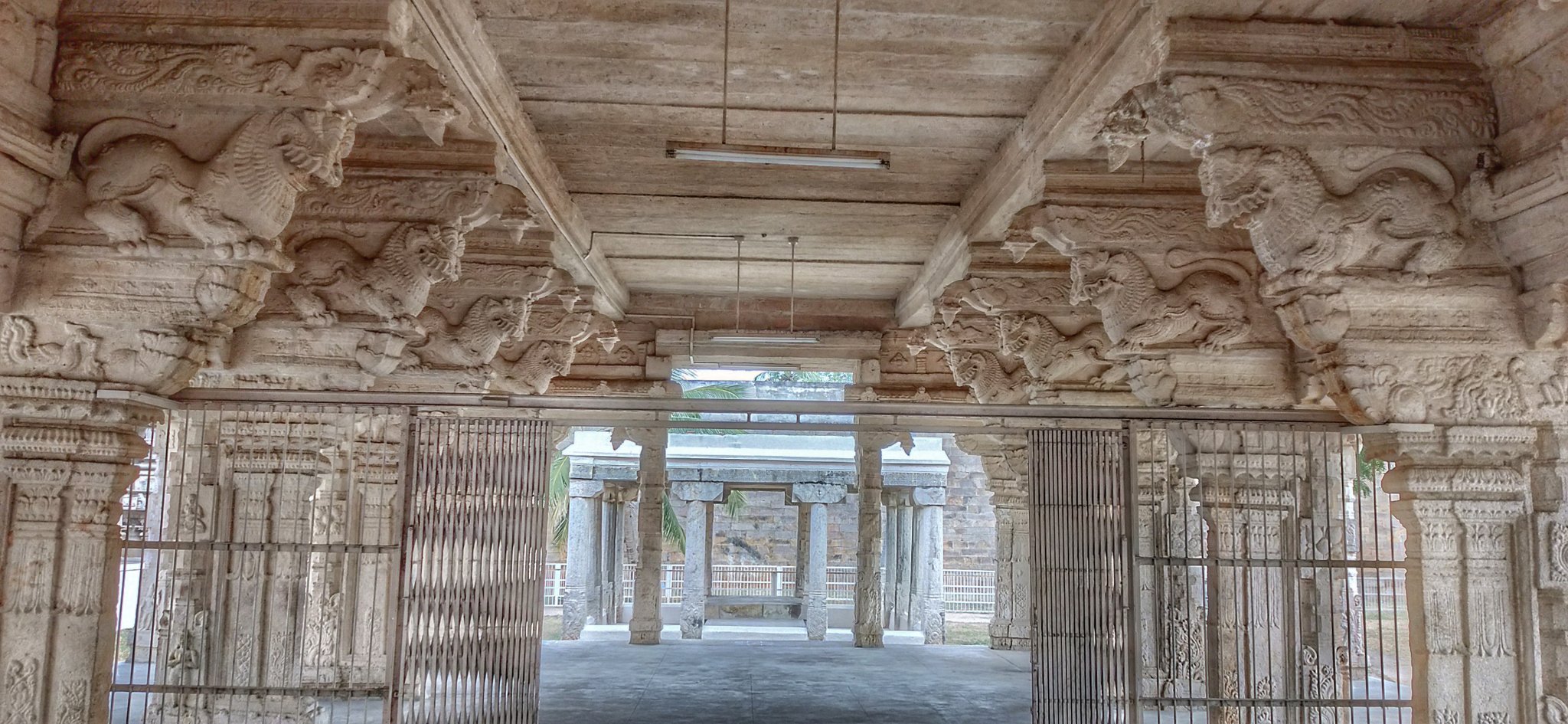 |
| 2nd Mantapam |
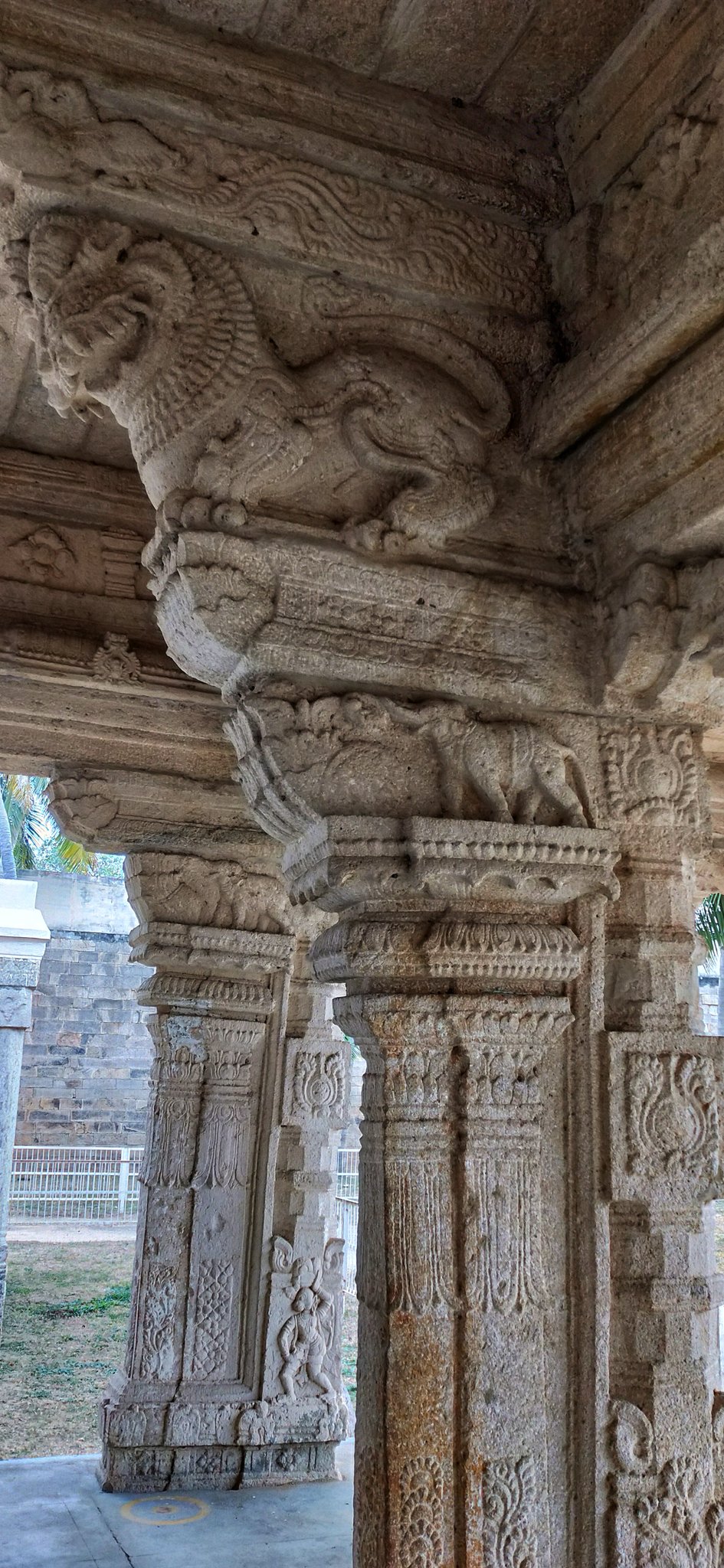 |
| Mantapam Pillar |
 |
| Vanara |
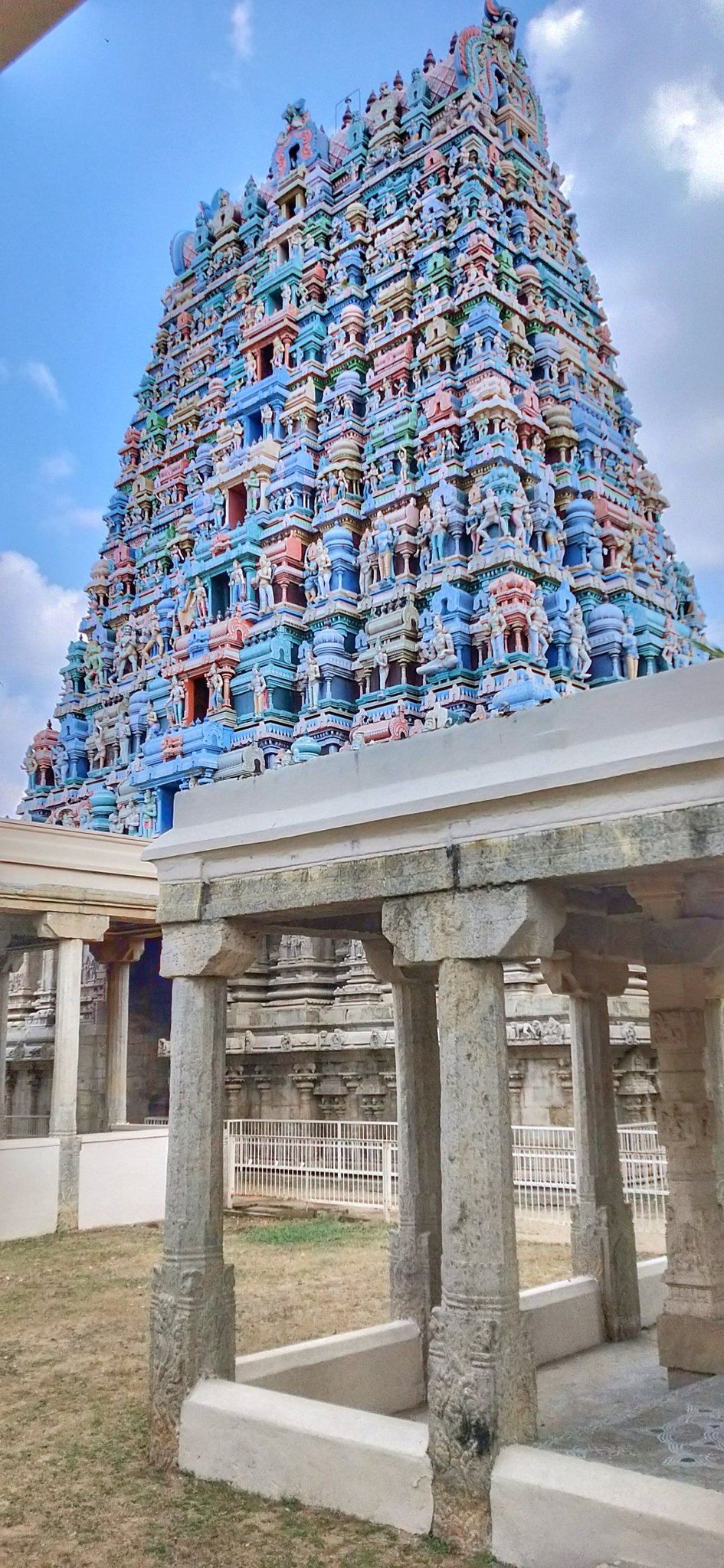 |
| Rajagopuram from 2nd mantapam |
One of the most interesting features of this Temple is the variety of animal carvings, especially monkeys. Here's one such carving that depicts a monkey checking out a snake & what appears to be a large cat attacking a bird. Such carvings are a recurring theme here.
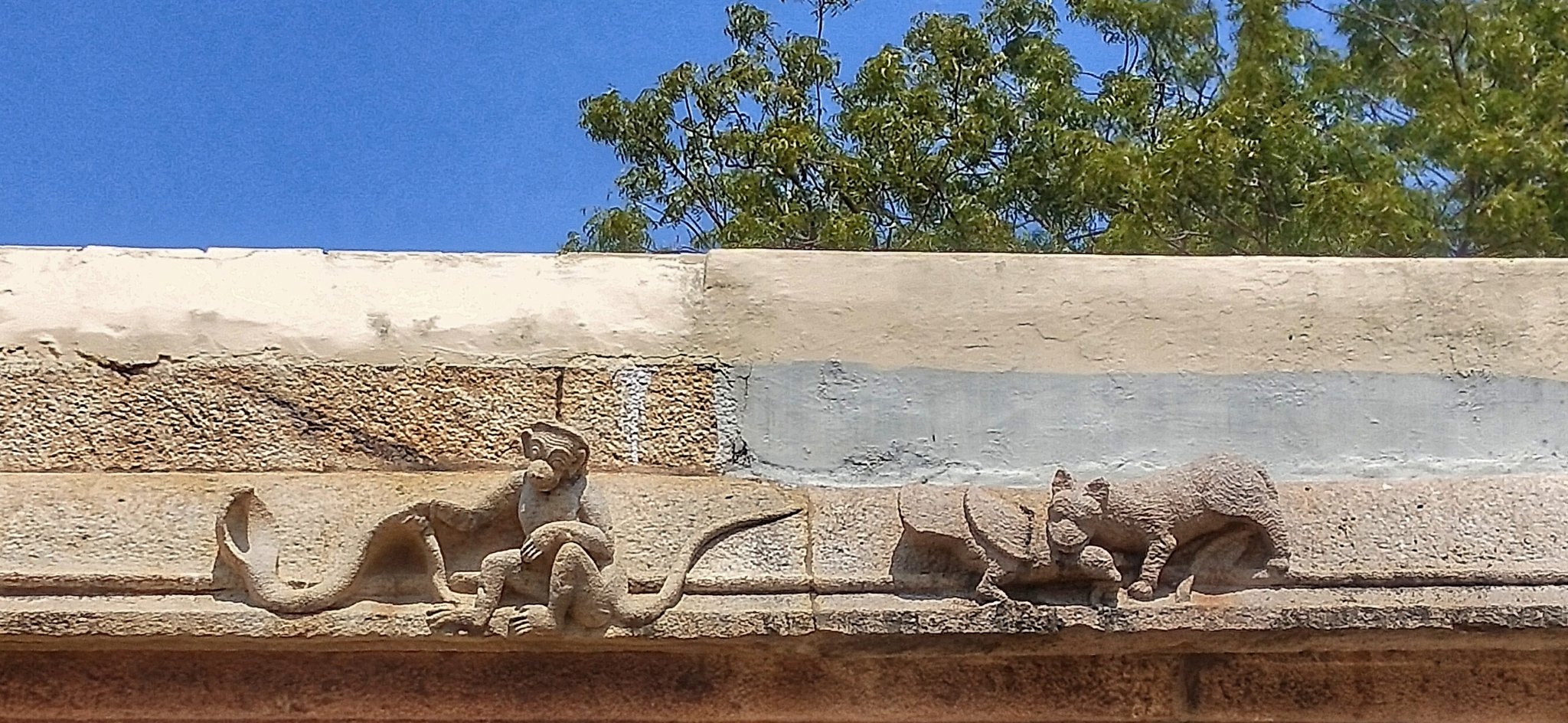 |
| Animal carvings |
This monkey is so lifelike literally making faces. The sculptor has captured the monkey's act so perfectly.
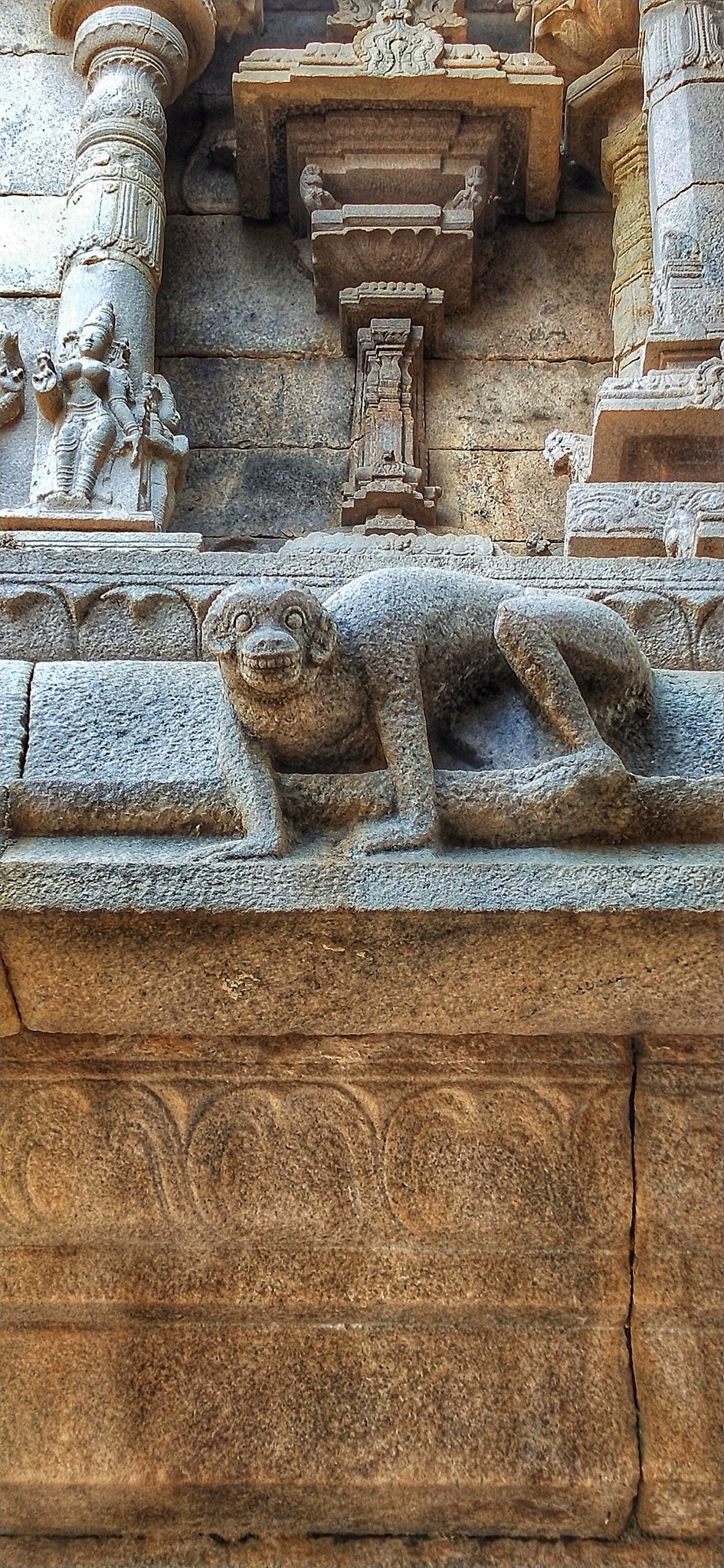 |
| A sneering monkey |
Another one sneering away. The great thing about Temples is that the sthapatis captured every aspect of life including animal behavior & recorded them in stone with such lifelike precision. Just how amazingly creative were those people.
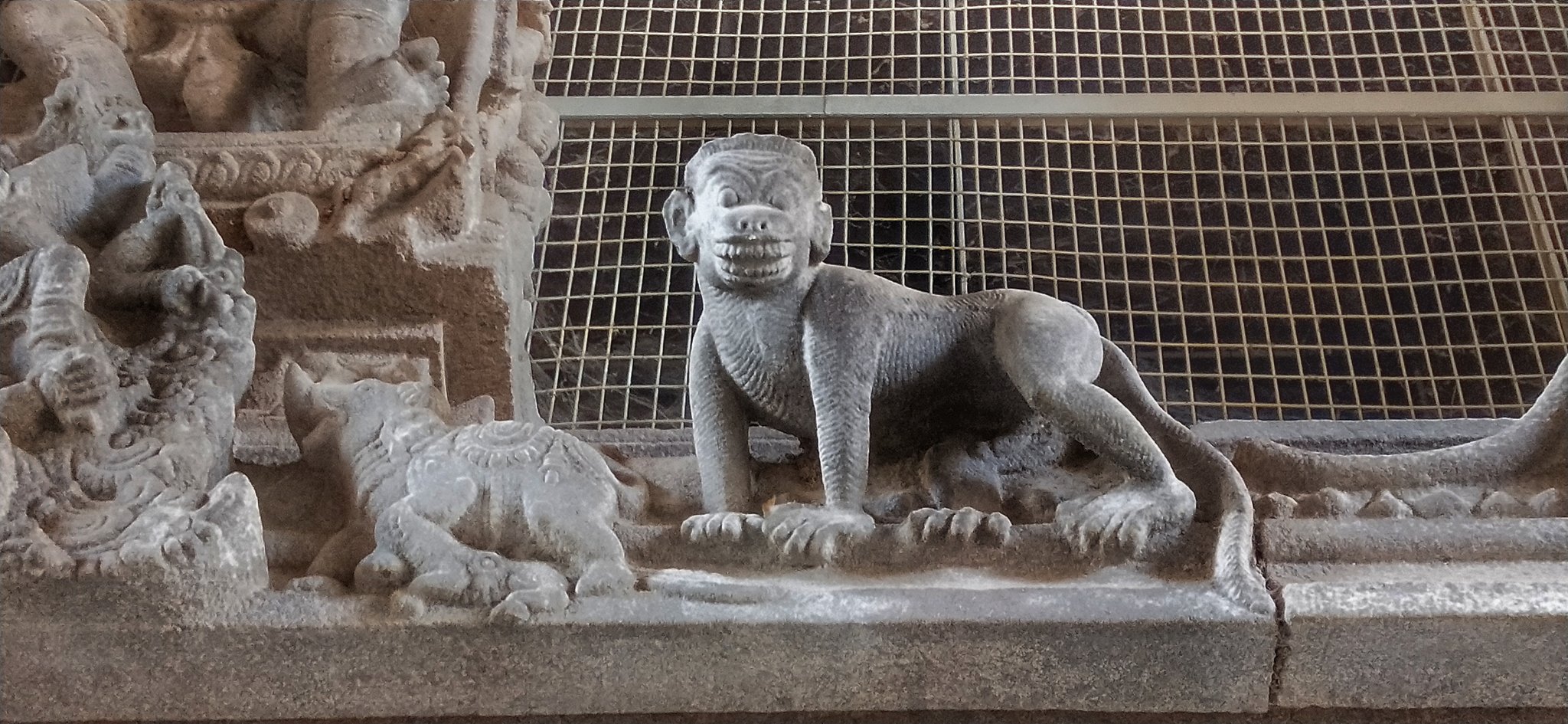 |
| Another sneering monkey |
On the 1st tier of the Rajagopuram are the carvings of Sita, Rama & Lakshmana. Both Rama & Lakshmana are holding the Kodanda. Also seen on their right is Maha Vishnu with Shanka/Chakra, Trivikrama with his left leg lifted high pointed towards the sky & Varaha avatara.
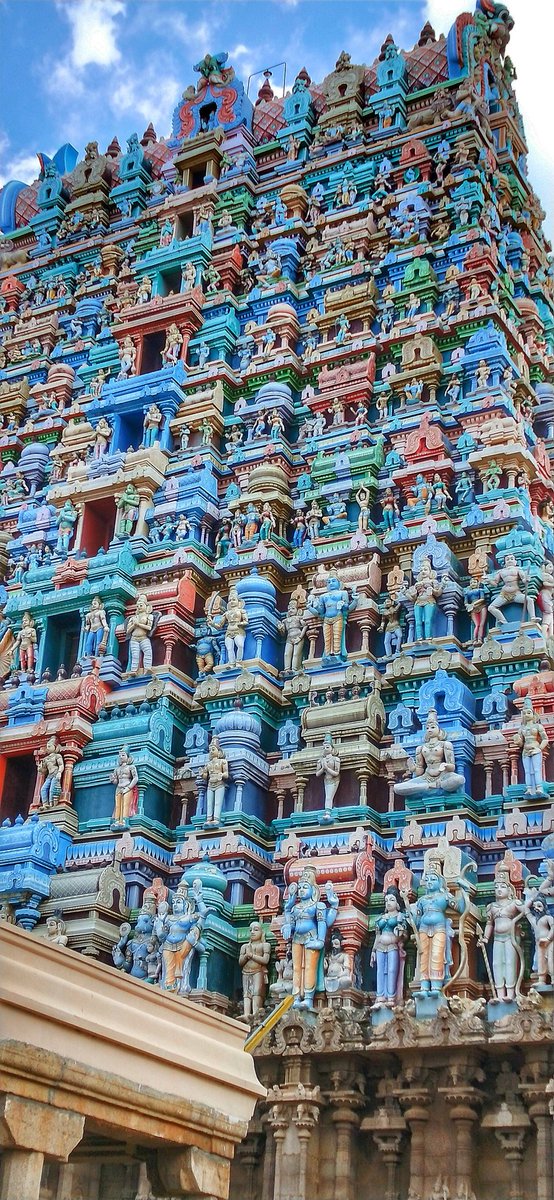 |
| Gopuram carvings |
The base of massive gopuram is made of Granite. Columns supporting the structure are filled up with innumerable carvings. Seen on the extreme right are the carvings of Sita, Rama & Lakshmana. In the middle is MahaVishnu. On the left is Lord Venkateshwara with Sridevi & Bhudevi.
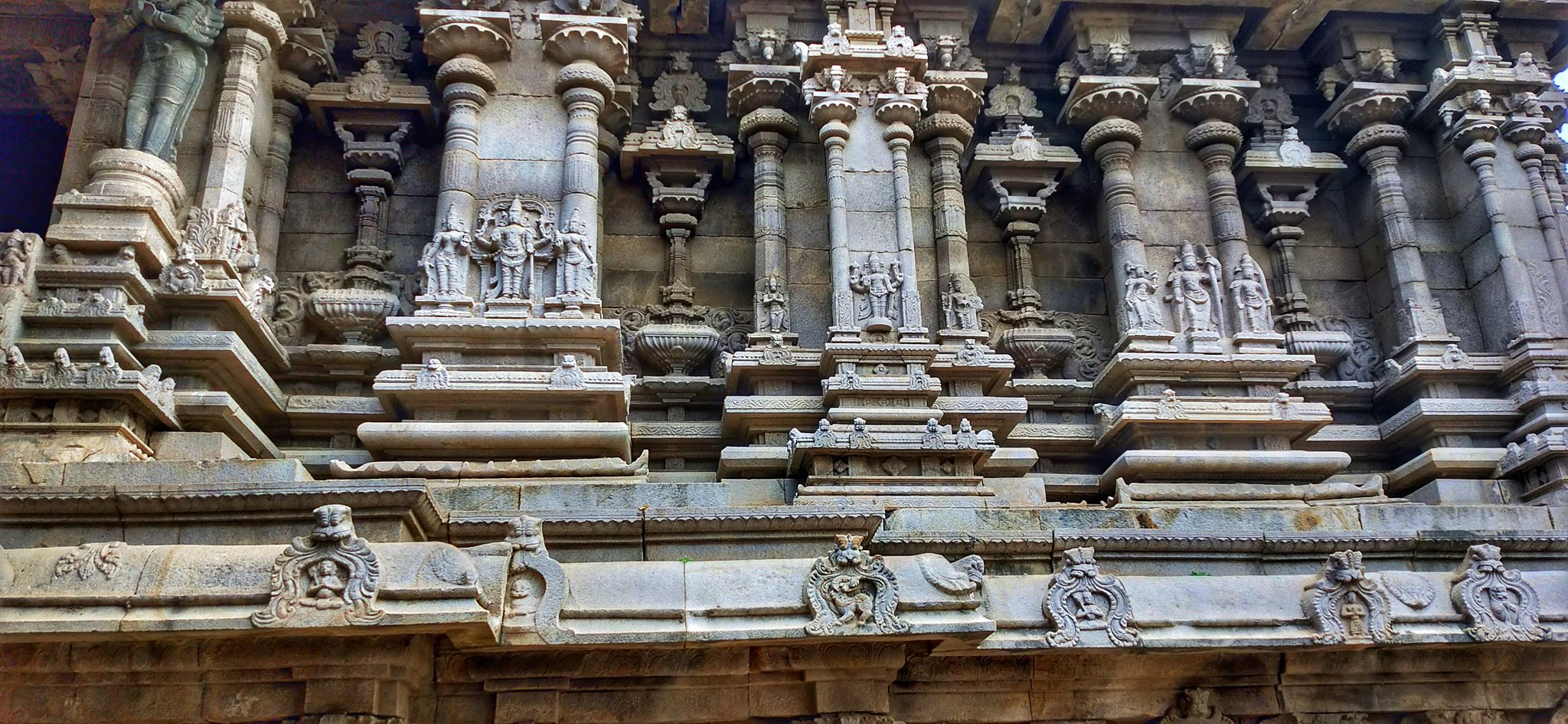 |
| Carvings on the granite base of the gopuram |
A magnificent carving of Trivikrama. Vamana grows to a gargantuan size as Trivikrama, with the 1st step covers all of bhulokha, 2nd step swarga & 3rd & final step mahabali offering his head for vamana to place his feet on, thereby sending mahabali to patalaloka.
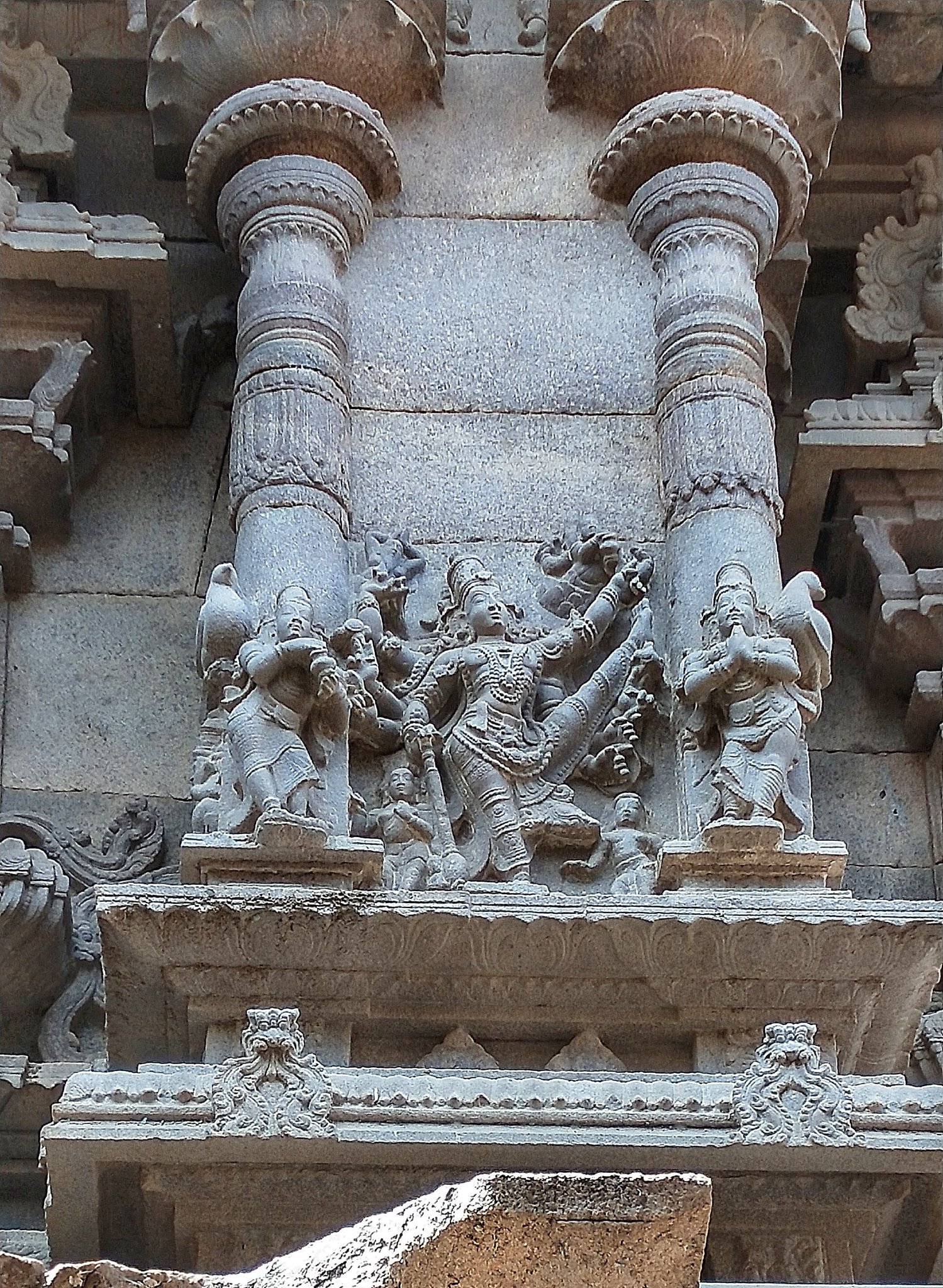 |
| Trivikrama |
Maha Vishnu seated on Garuda. Also depicted separately is Garudalwar on top. Also notice the lifelike monkey carvings. Vaikuntanathar Temple has a number of such carvings depicting various animals.
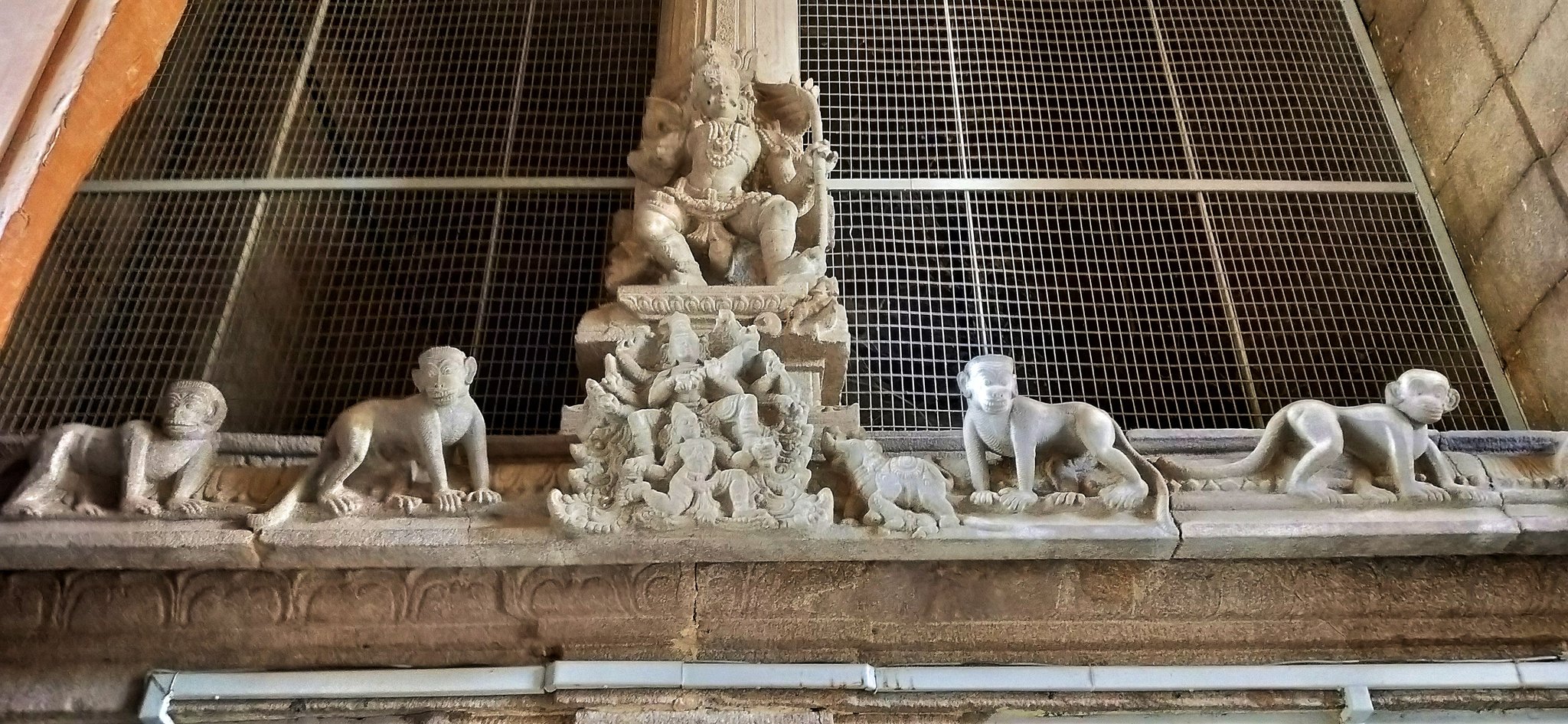 |
| Maha Vishnu seated on Garuda |
One of the most amazing carvings from the Vaikuntanathar Temple is this carving of a horse & an elephant. Zoom in to notice how both the animals are comprised just of female beings. They are striking such amazingly different poses to bring out the contour of the animals.
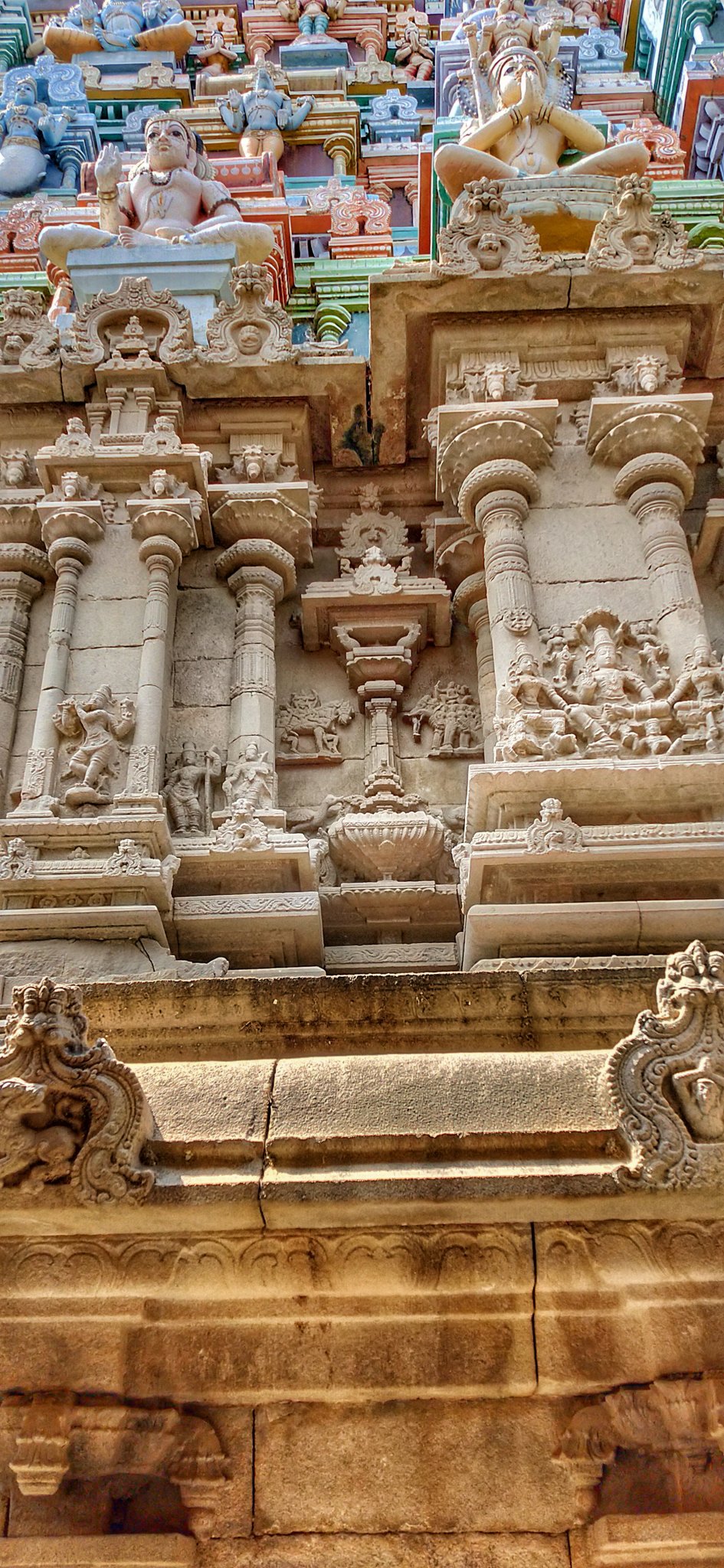 |
| Optical illusion carving |
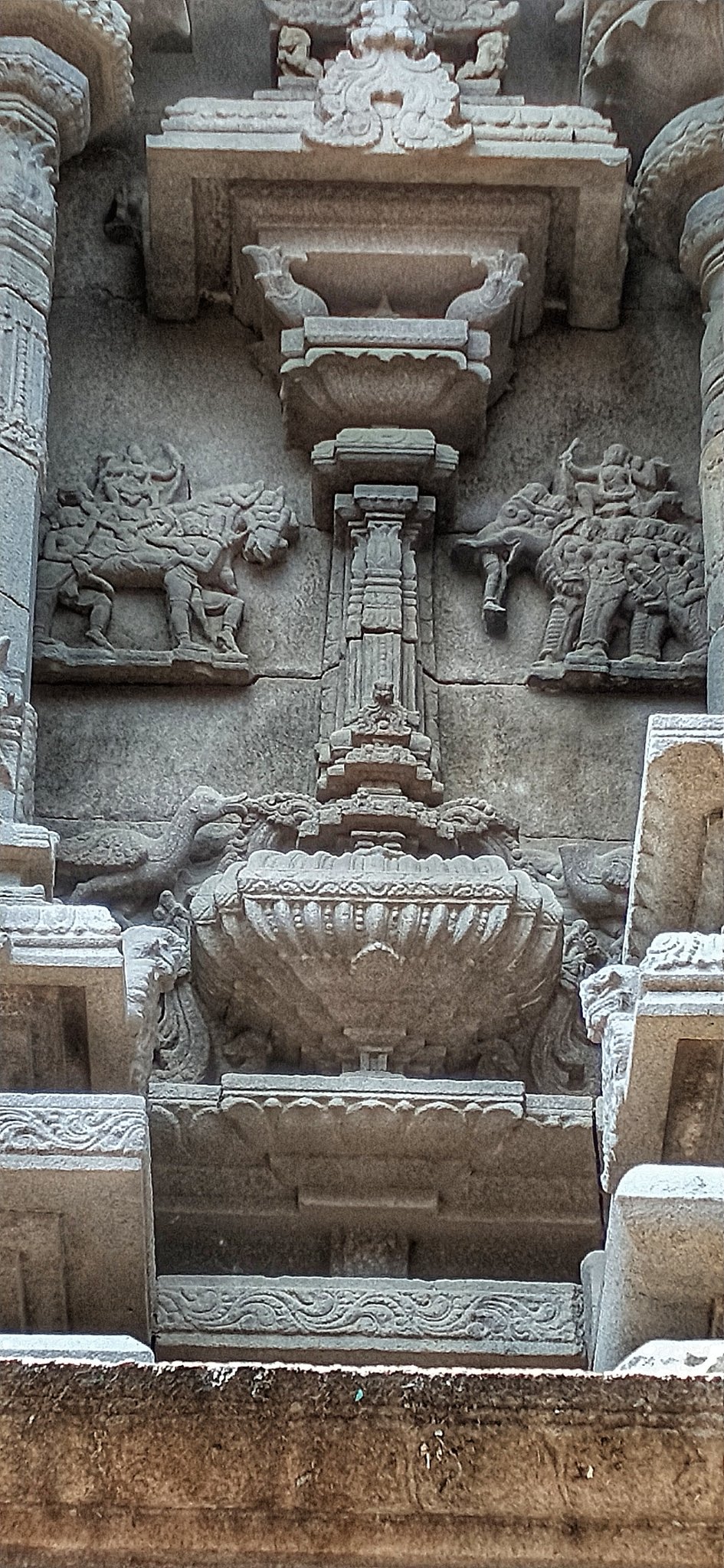 |
| Optical illusion carving |
Carving of Lakshmi Narayana. Here Lakshmi manifests in two separate forms as Sridevi & Bhudevi. The former representing energy & the latter fertility. Observe the hood of the Shesha behind Maha Vishnu who holds an Abhaya mudra with his front right arm.
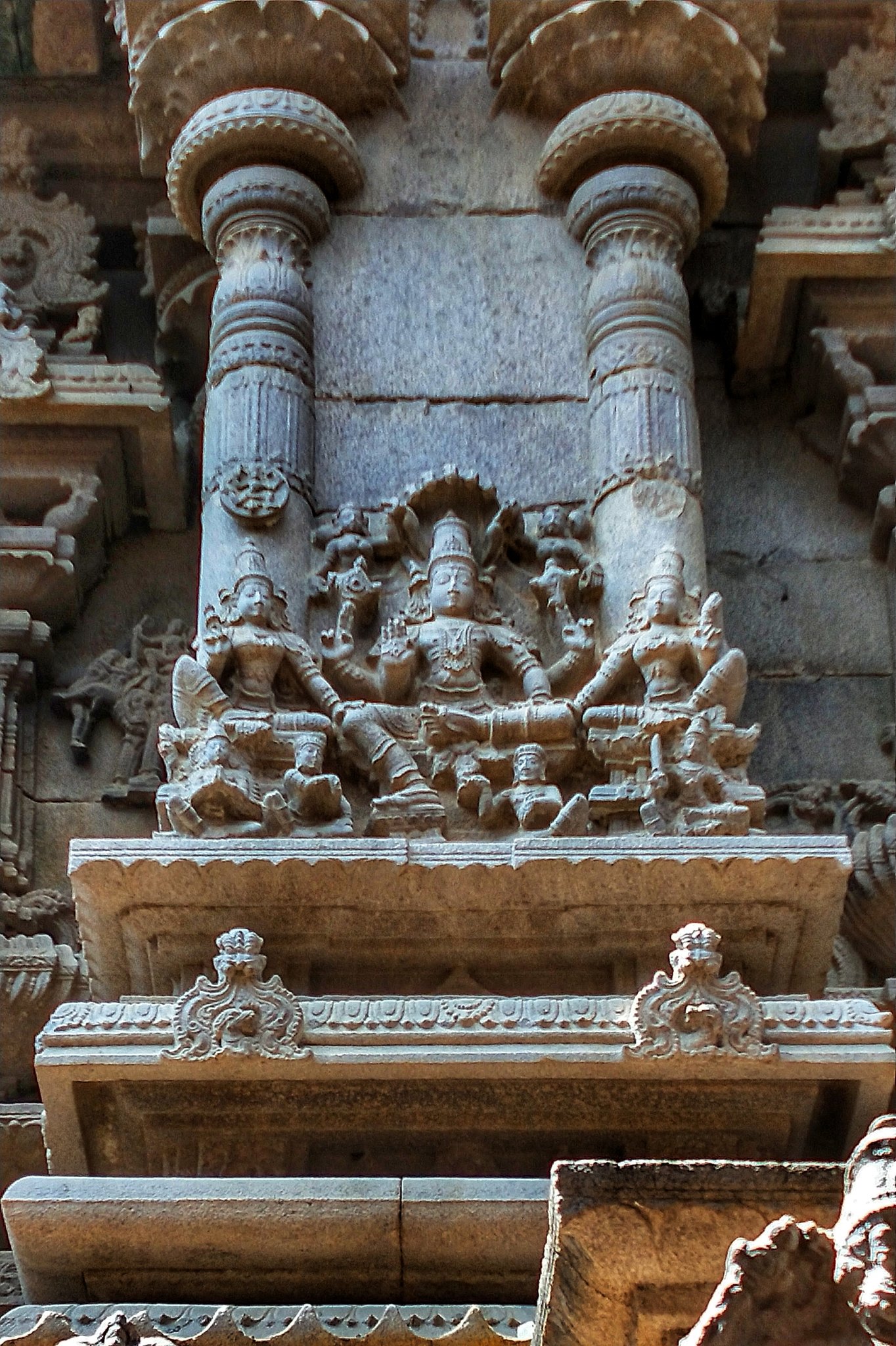 |
| Lakshmi Narayana |
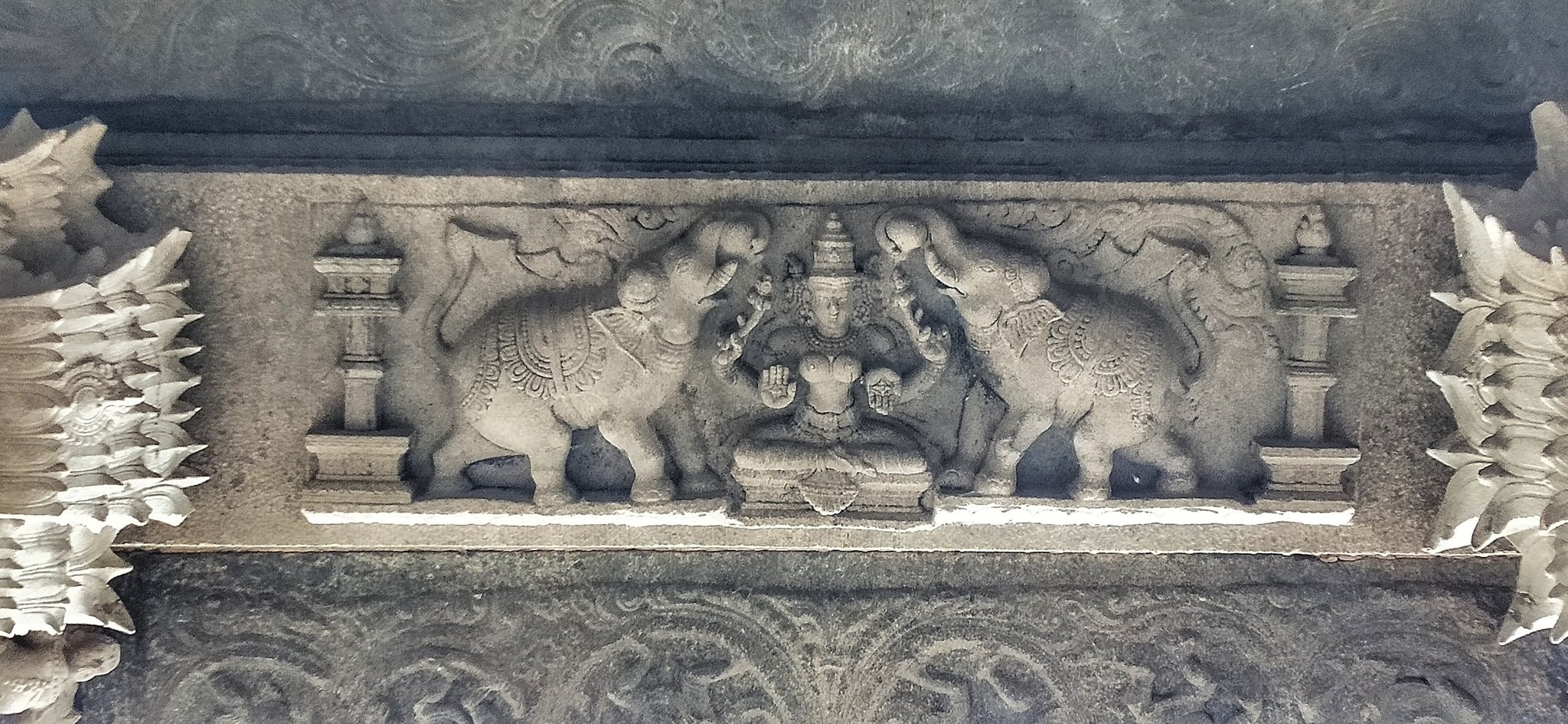 |
| Gajalakshmi on the ceiling of the Gopuram |
 |
| Entrance Dwarapalakas |
 |
| Base of the Rajagopuram |
 |
| Base of the Rajagopuram. |
































































